Oregon’s Painted Hills have gained such renown that they’re often mistaken as a National Park. Sticklers stress that Crater Lake National Park is the only Oregon site to hold this distinction. But don’t let the semantics fool you. The Painted Hills and John Day Fossil Beds National Monument are no less remarkable than their famous neighbor.
This post contains affiliate links. As an Amazon Associate I earn from qualifying purchases made from the links on this site, at no extra cost to you. Thanks for supporting our family business!
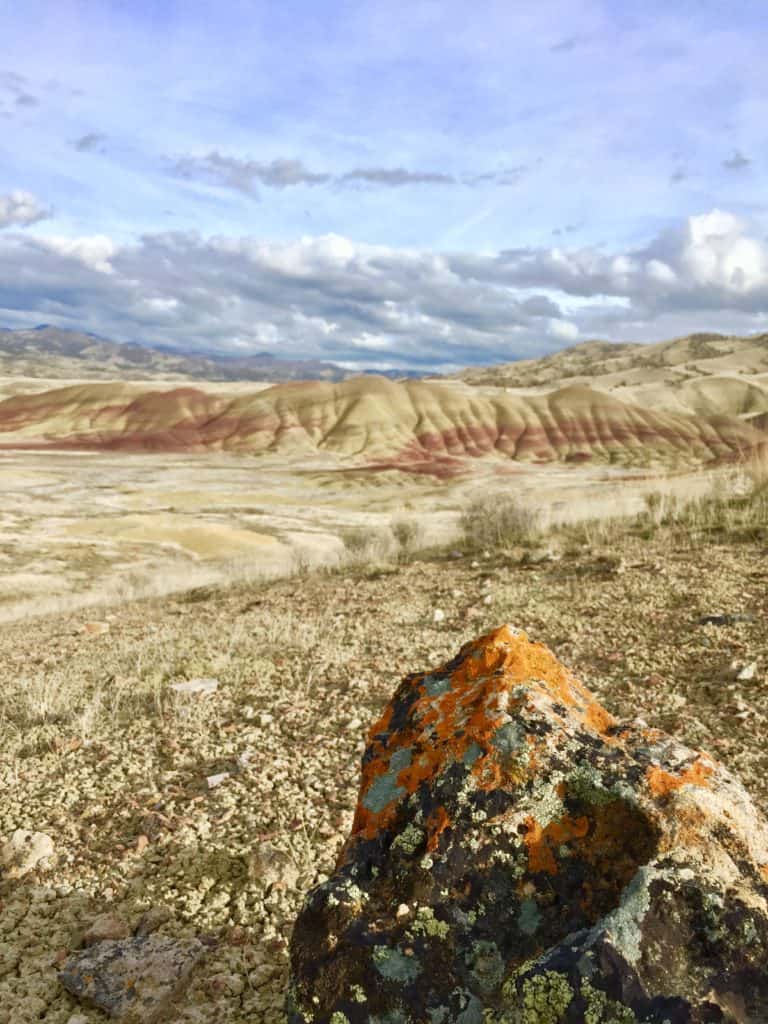
Table of Contents
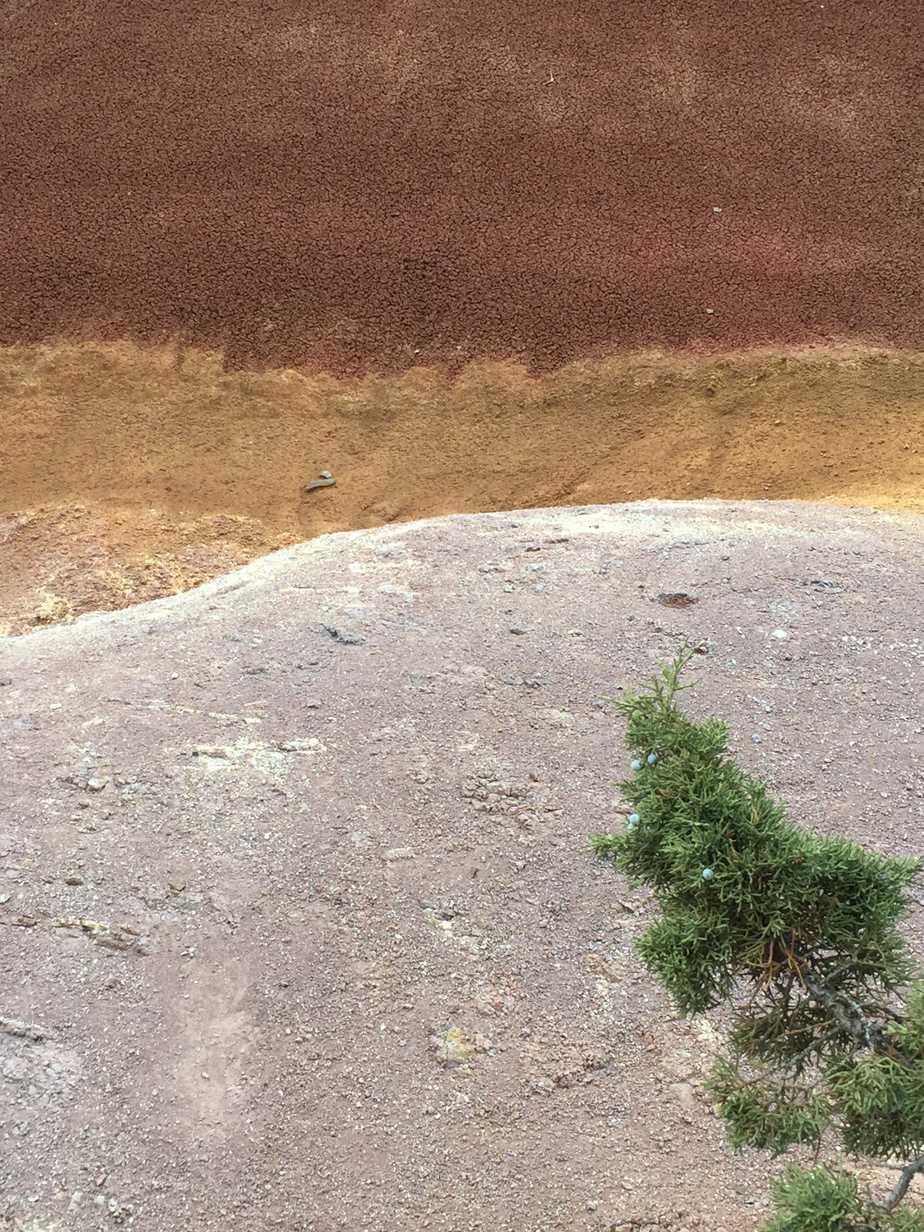
Jennifer and I had the opportunity to spend a week exploring the John Day Fossil Beds and the surrounding countryside. We were blown away and we can’t wait to return with the whole family.
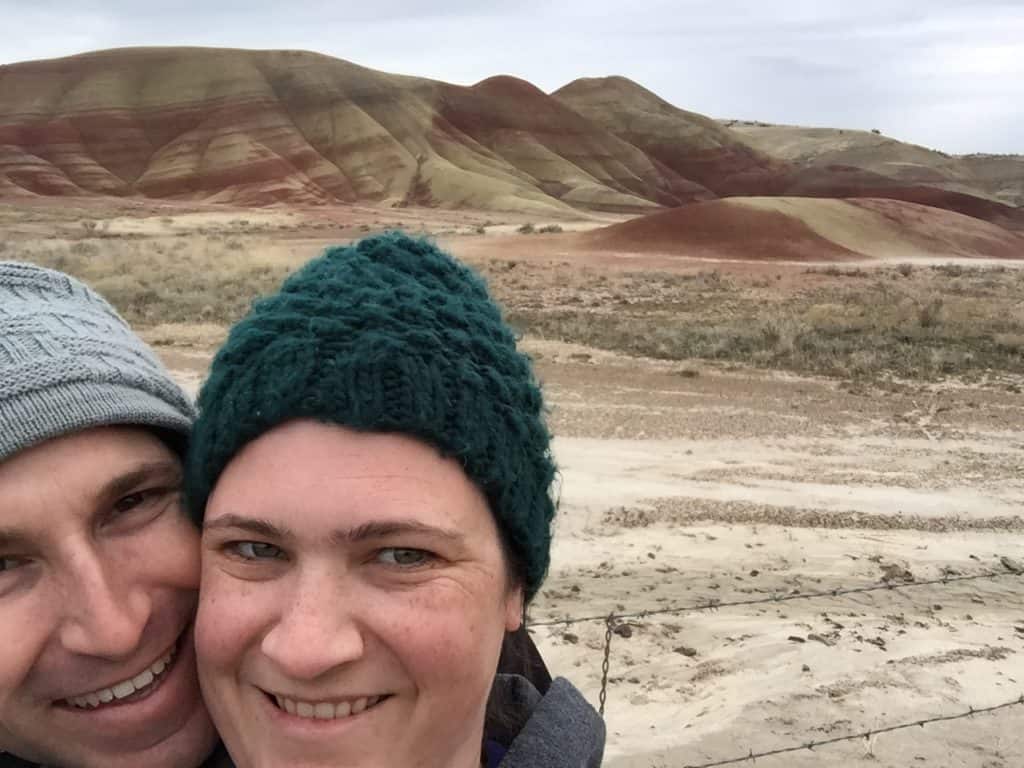
John Day Fossil Beds National Monument is a fantastic stop for a family roadtrip. In this post I’ll guide through the best sites in and around “Painted Hills National Park” before filling you in on what to know before you go.
Oregon’s Monumental Wonder
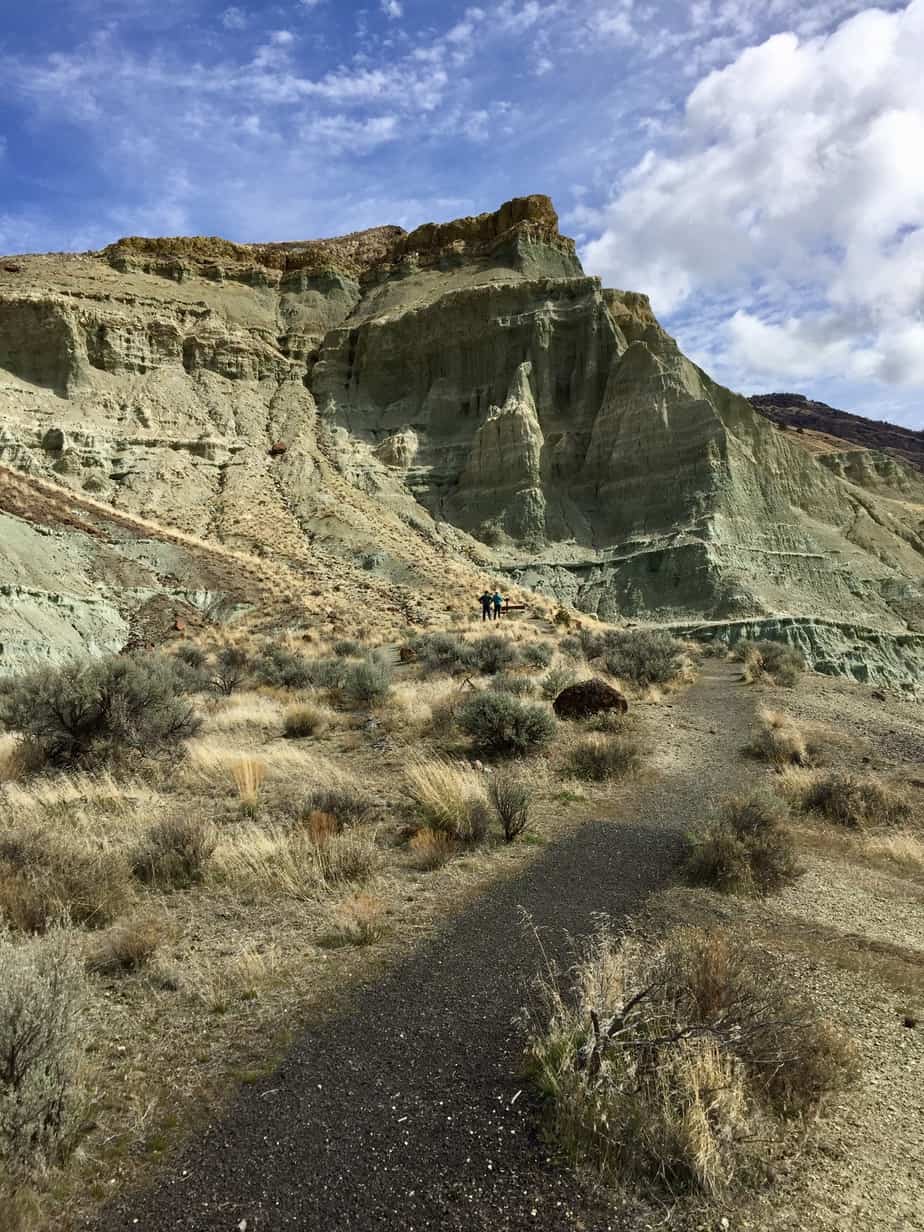
The Painted Hills are the chief attraction of John Day Fossil Beds National Monument. National Monuments are another kind of park that’s administered by the National Park Service.
There are differences between National Parks and National Monuments, but those details rarely add up to a noticeable difference in visitor experience. Most National Monuments are the matinee of the NPS system, giving all of the value of a National Park for only half the trouble.
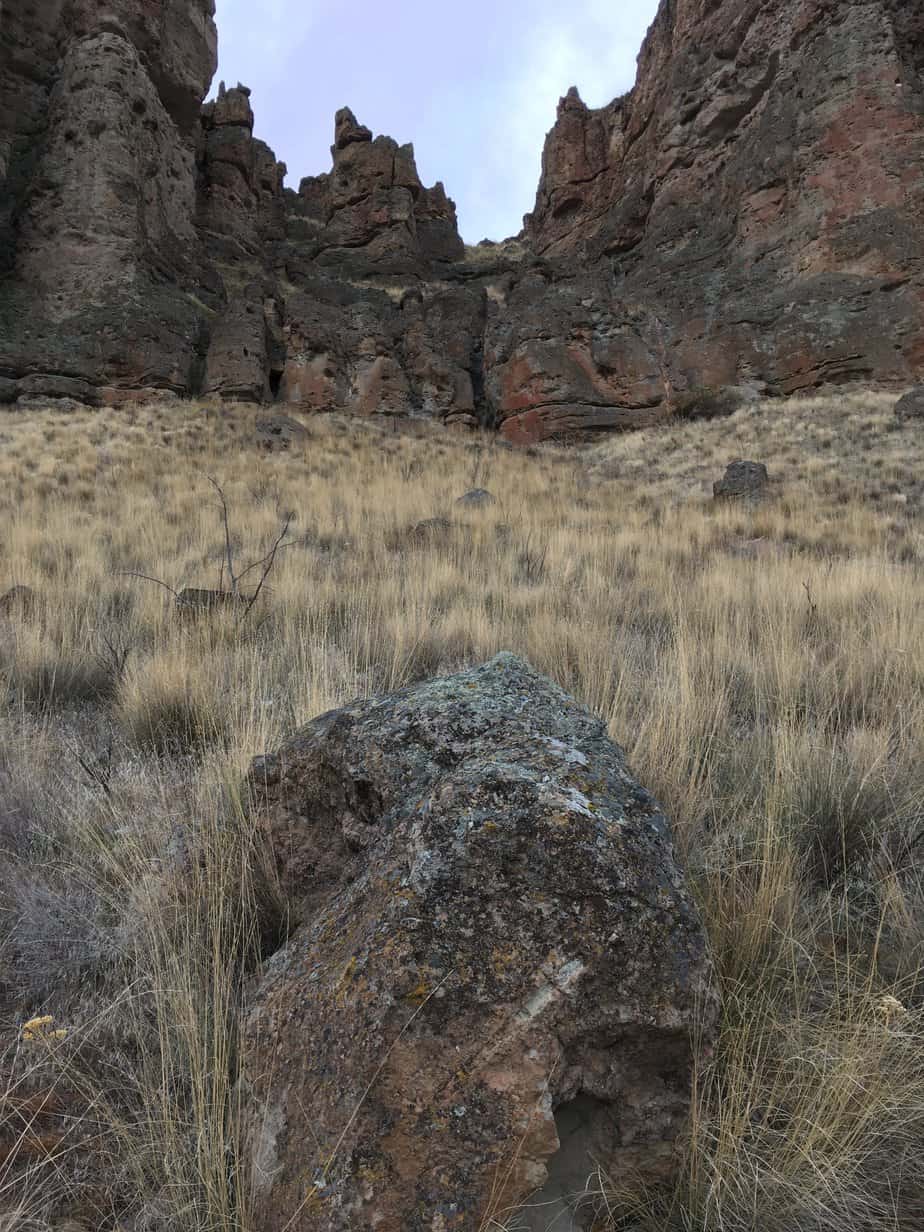
That’s certainly the case at this National Monument. It’s hard to think of another site that offers so much beauty, interest, and variety.
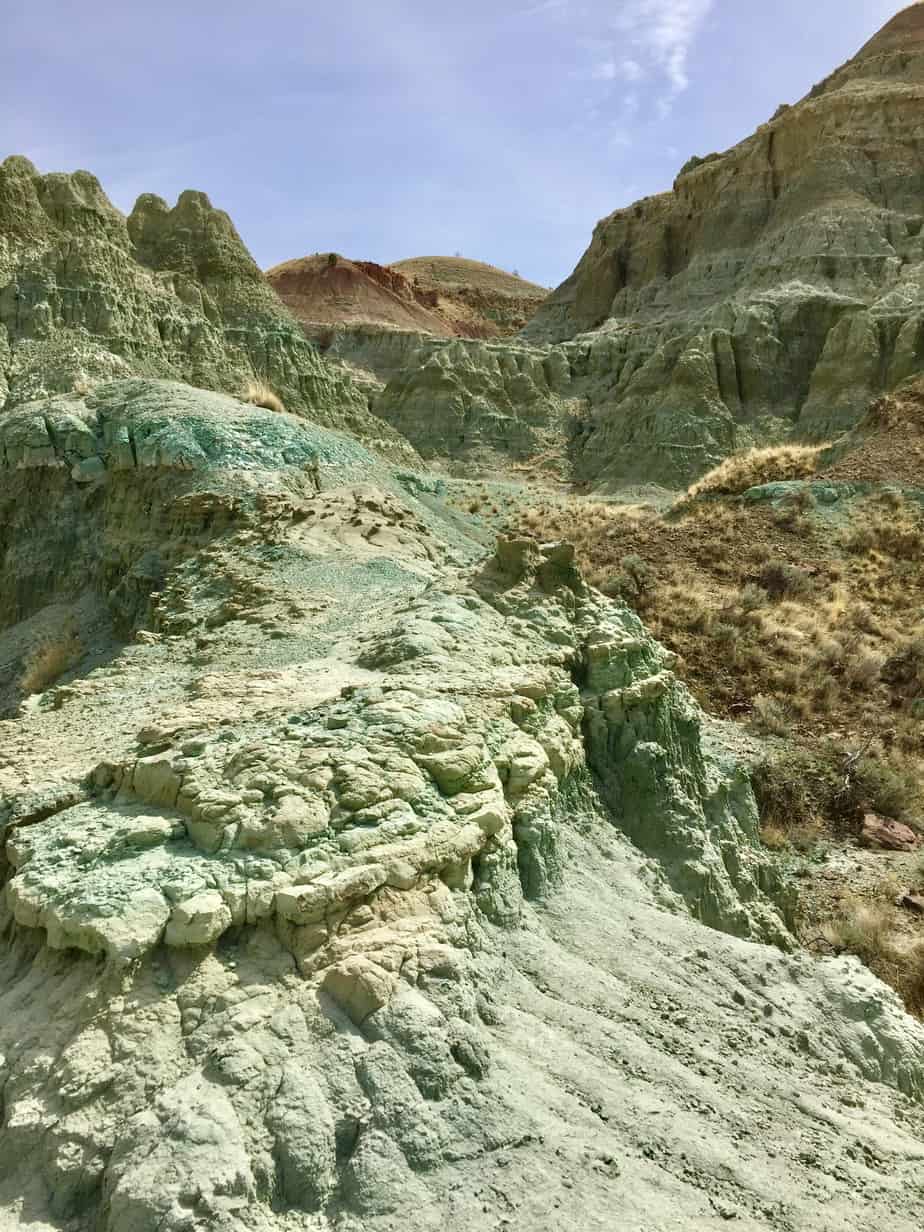
I’ve traveled the American West and seen the vast majority of its landscapes. The John Day Fossil Beds are one of the most unique places in North America. Wild and rugged landforms change radically over a distance of a few miles, yards, and even feet.
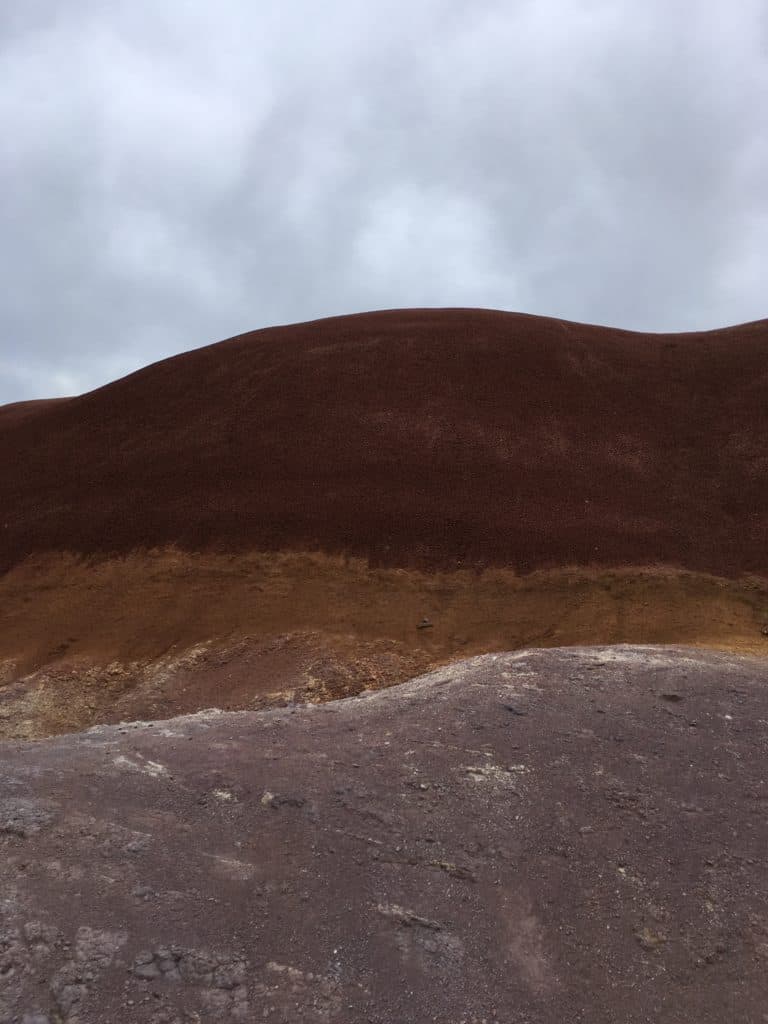
The Monument preserves one of the most complete fossil records of the Cenozoic Era, known as the Age of Mammals. The remarkable assortment of fossil-rich layers allow us to study Oregon’s climate and ecosystems from 44 million to 7 million years ago.
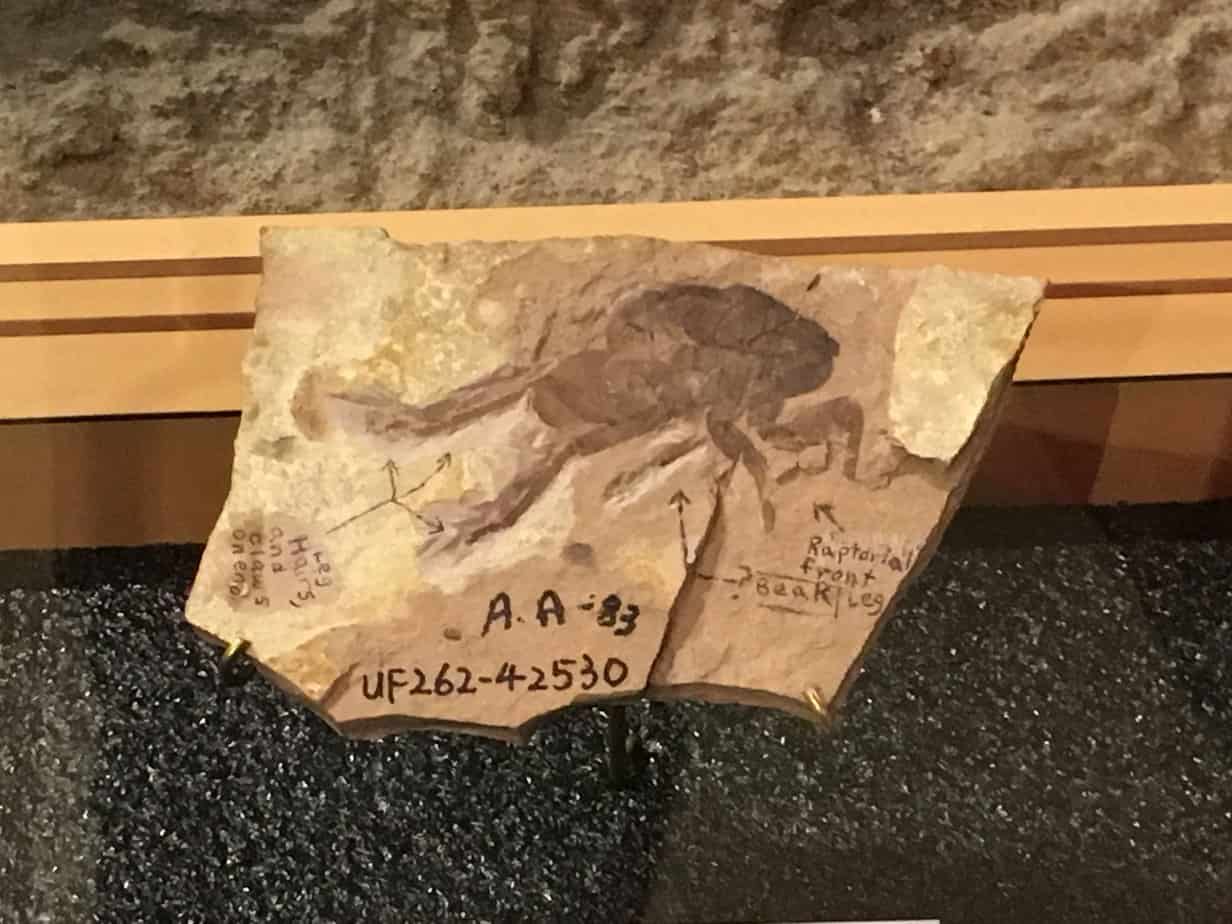
Seven distinct fossil-rich formations provide a strong record of Oregon’s natural history spanning 50 million years.
“Fossils” includes a wide range of mammals, plants, as well as several reptiles and other creatures. Earth’s history has even been catalogued in paleosoils—the fossilized soils that have enriched the Painted Hills with their vibrant colors.
Educational, Accessible, & Adventurous
Educational resources and accessible trails make the John Day Fossil Beds a great STEAM destination. The natural and human history of the John Day Fossil Beds offer a wide range of fields for students to explore. The National Monument is a fantastic place to learn geology, paleontology, ecology, biology, and American history.
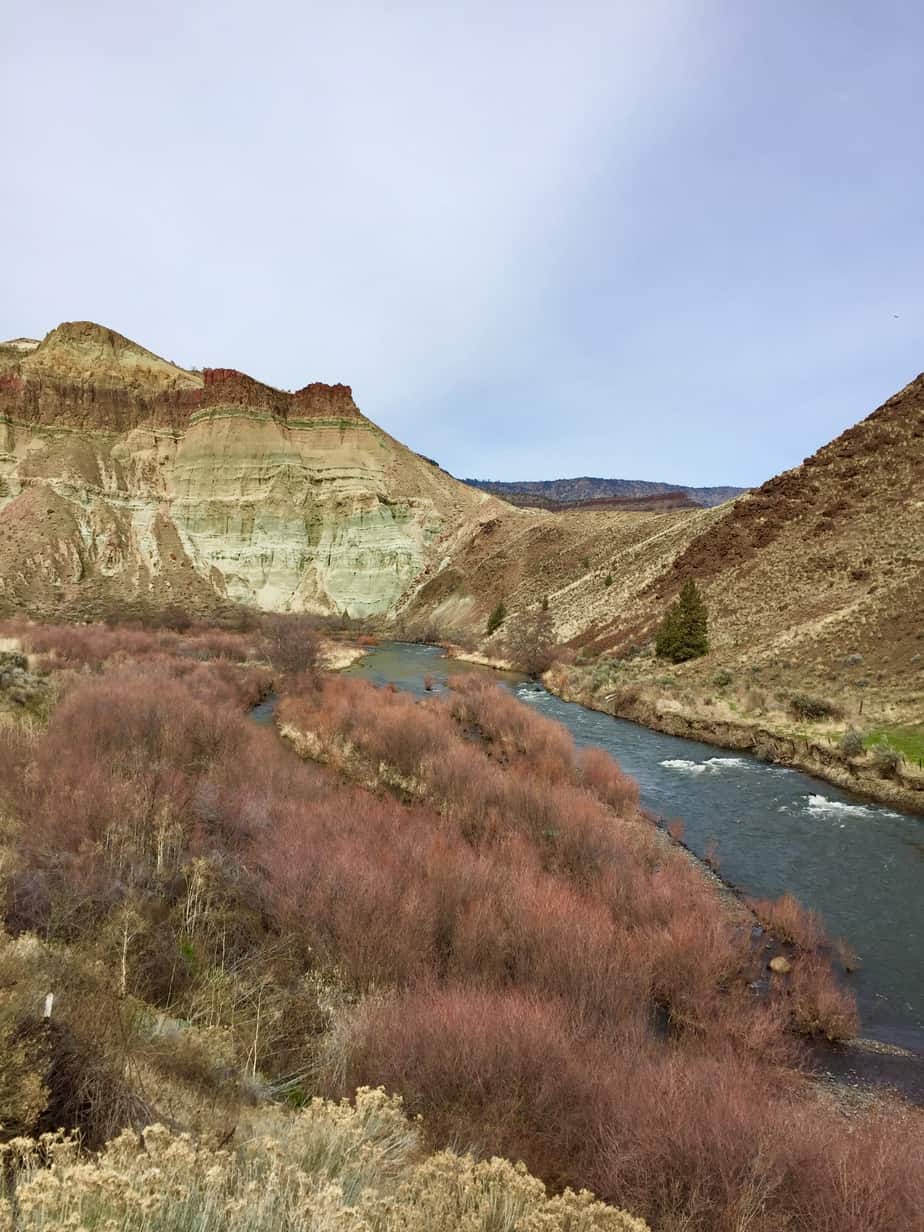
The monument’s fifteen trails are notable for their accessibility. Only two of the trails exceed a mile in length, and most trails are less than a mile round trip.
The short trails are ideal for roadtripping families allowing parents plenty of ways to see the monument without overdoing it. Better yet, nearly all of these trails are accompanied by well-developed parking lot and picnic area.
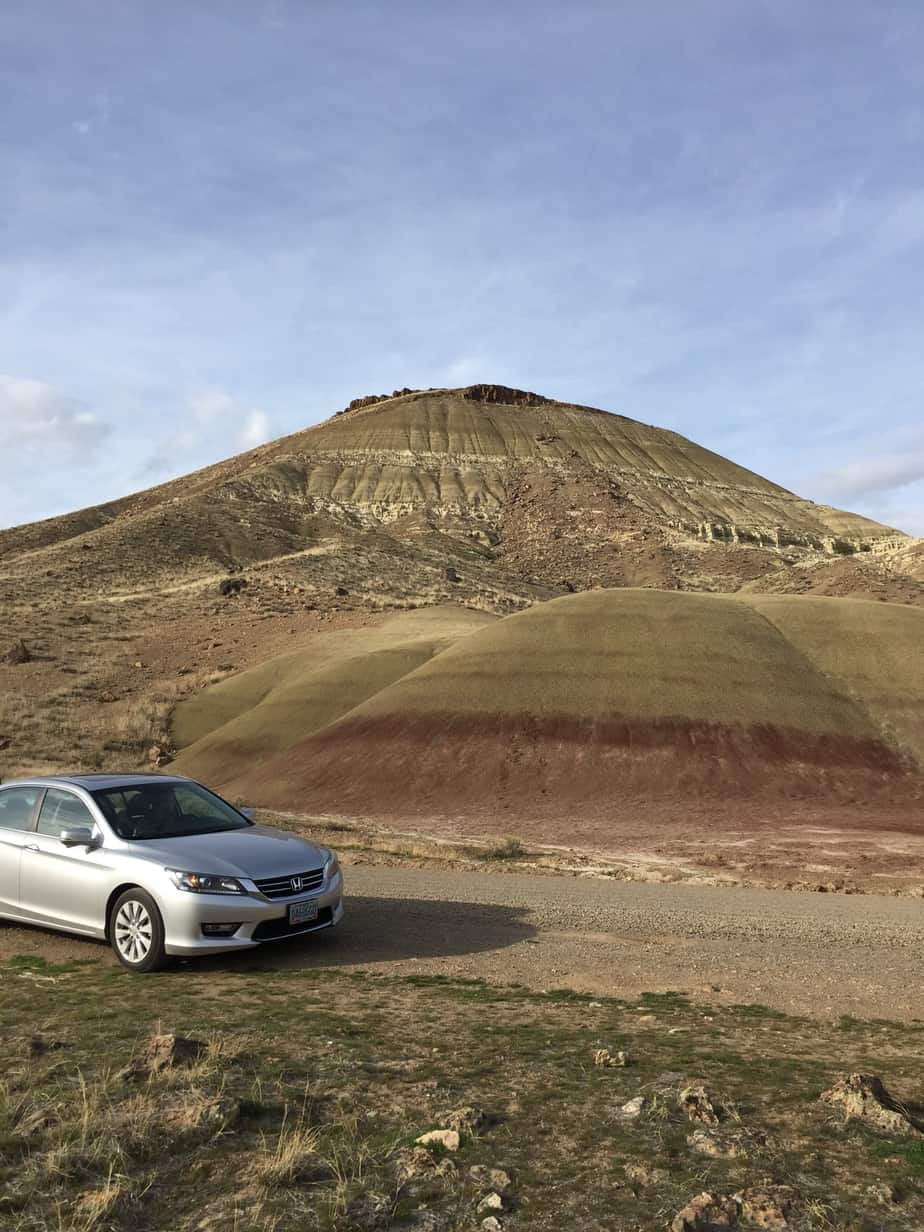
Finally, the John Day Fossil Beds are situated in a remote and remarkable part of Oregon. Wheeler County is one of the least developed counties in Oregon, making it a great place to spot wildlife, enjoy wide open spaces, and experience authentic country living.
The rustic, rugged landscape make for memorable, scenic drives to and from the three units that make up this national monument. At only 3 hours’ drive from the Portland Metro area, it makes for a beautiful day trip too!
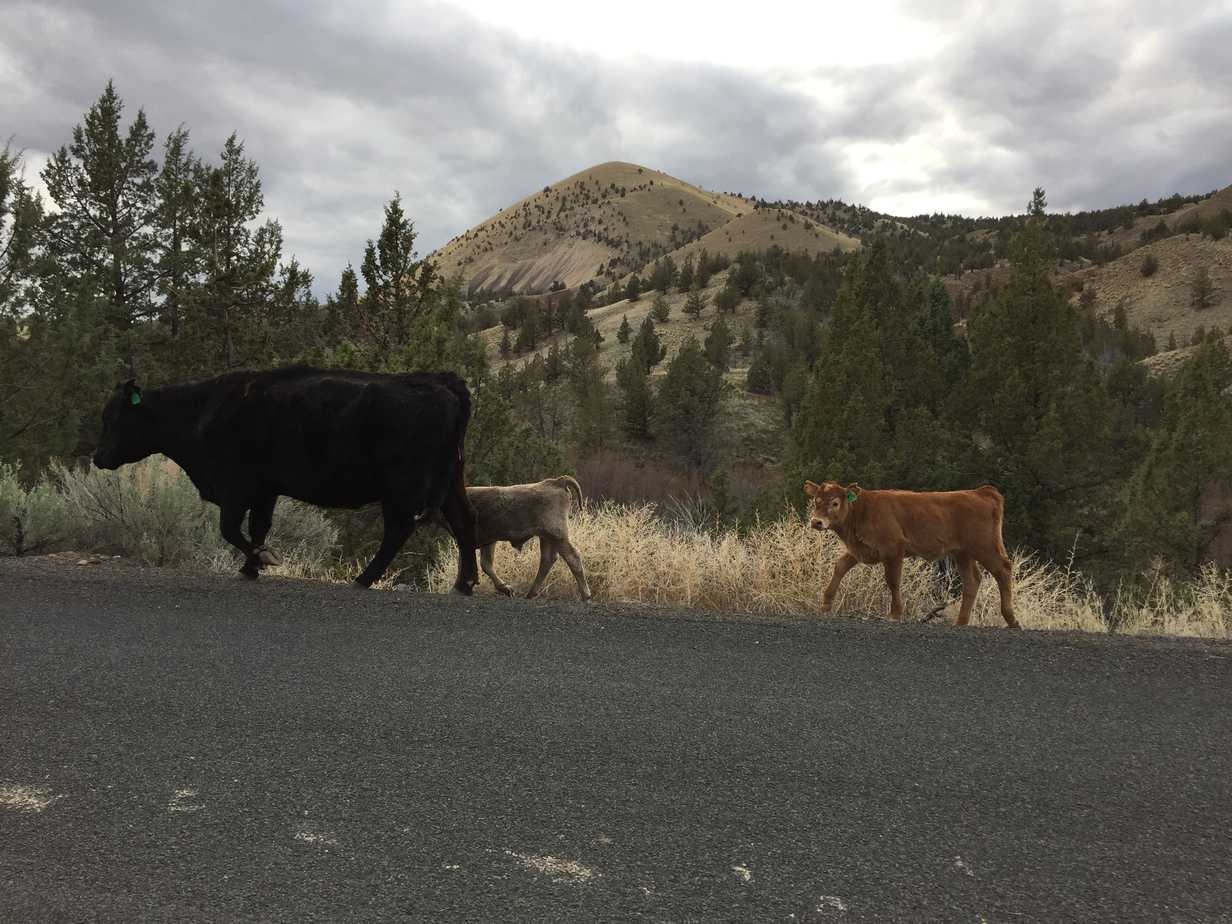
All told, this National Monument is a great place to get your children exploring, learning, and thinking. Here’s our list of top stops in and around the John Day Fossil Beds, starting with its legendary landmark:
#1 The Incredible Painted Hills
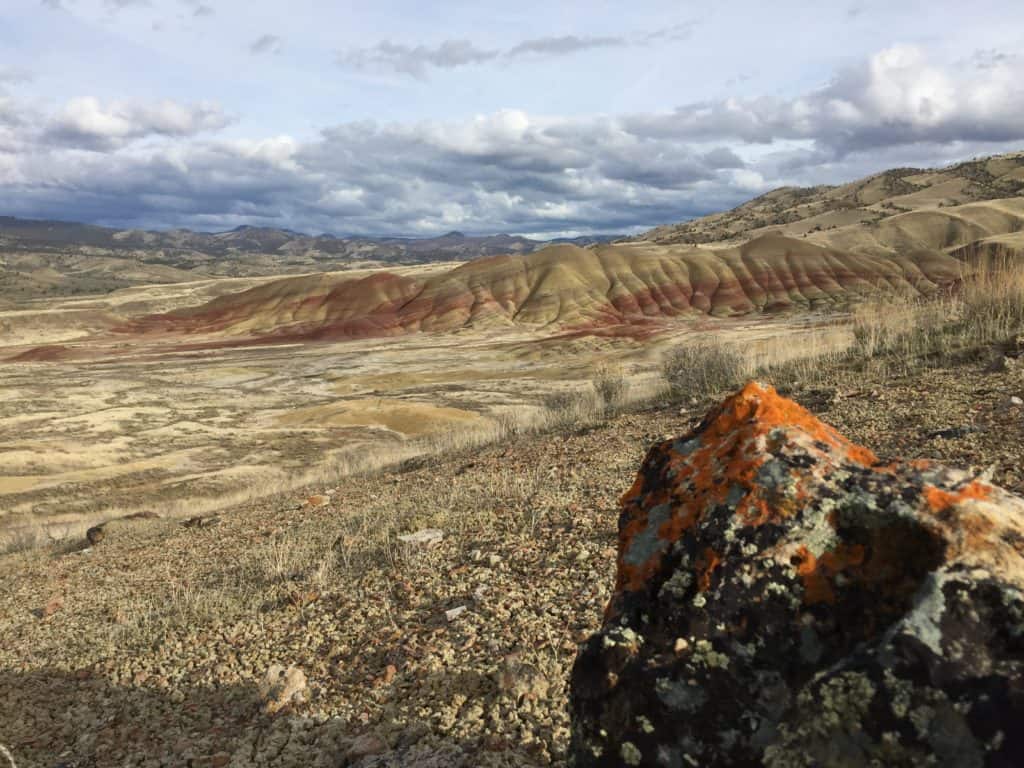
How do I begin to describe Oregon’s Painted Hills? The American West has its share of badlands—Sonora’s Painted Desert, the Badlands of the High Plains, etc. The Painted Hills eclipses all of them.
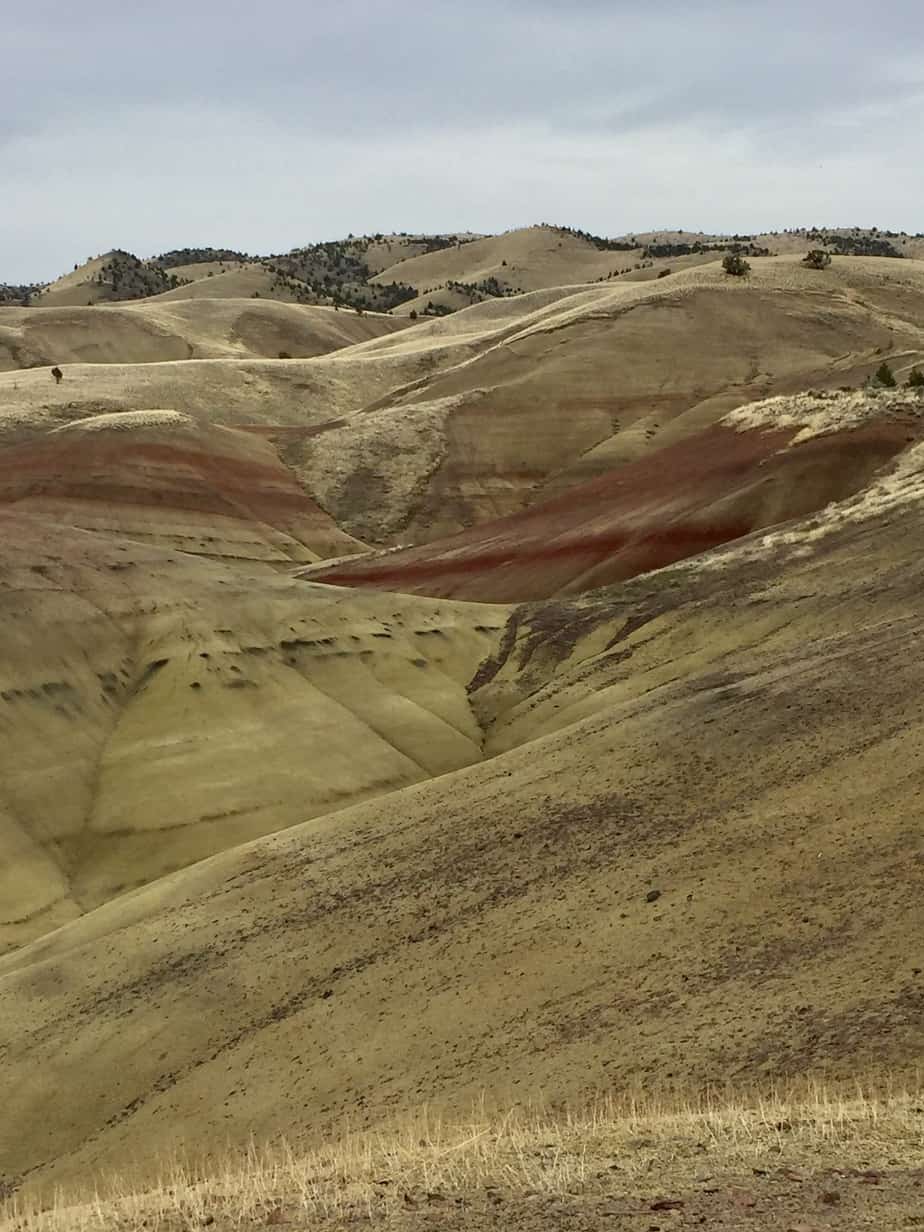
Oregon’s Badlands offer richer and stranger colors than their counterparts in Arizona and the Dakotas. The colorful hills offer deep hues of yellow, orange, maroon, lavender, and pink. Other areas of the John Day Fossil Beds feature different colors such as green and even deep turquoise.
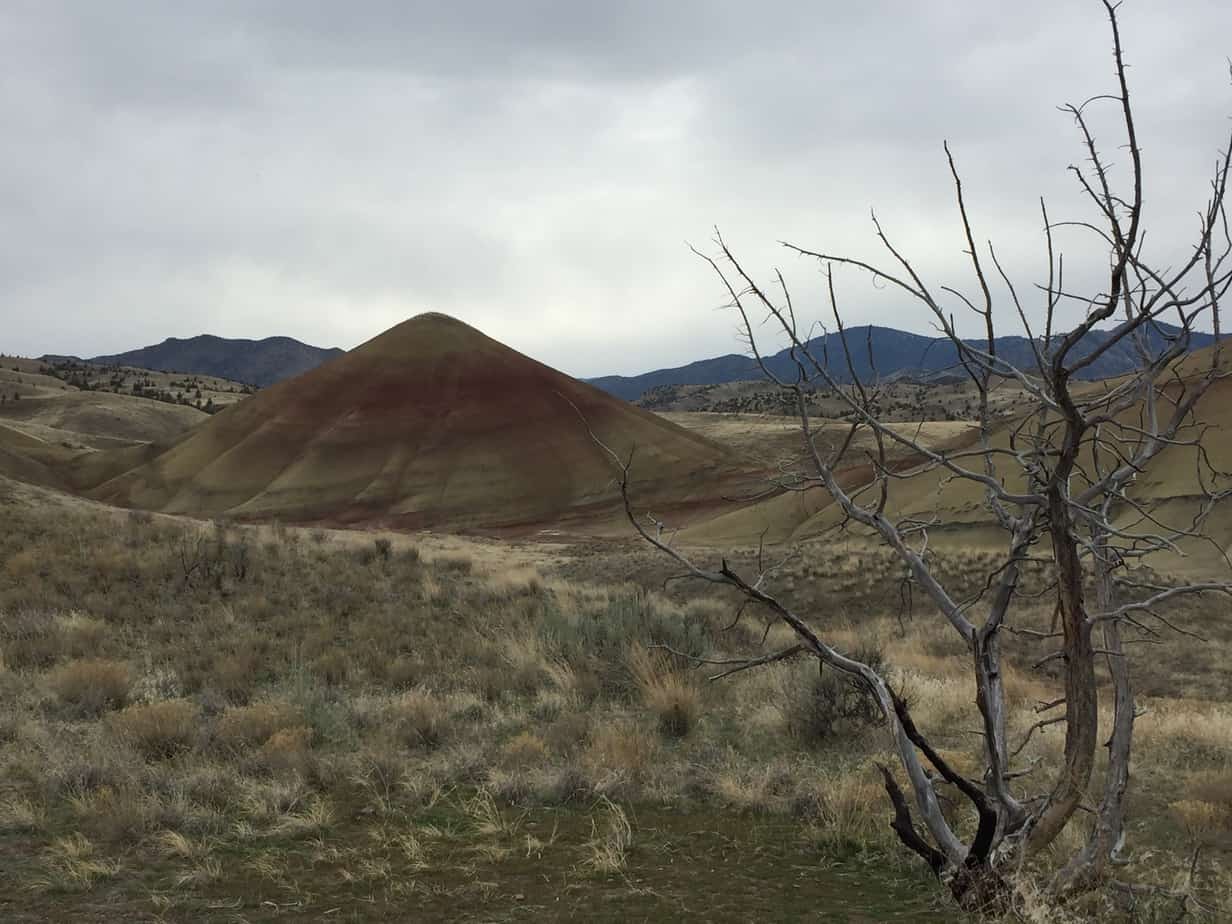
John Day’s colorful hills are perfectly set within the rugged, wild beauty of the Pacific Northwest. Robust, burgundy basalt cliffs and desert prairie frame the Painted Hills giving it a beauty beyond words.
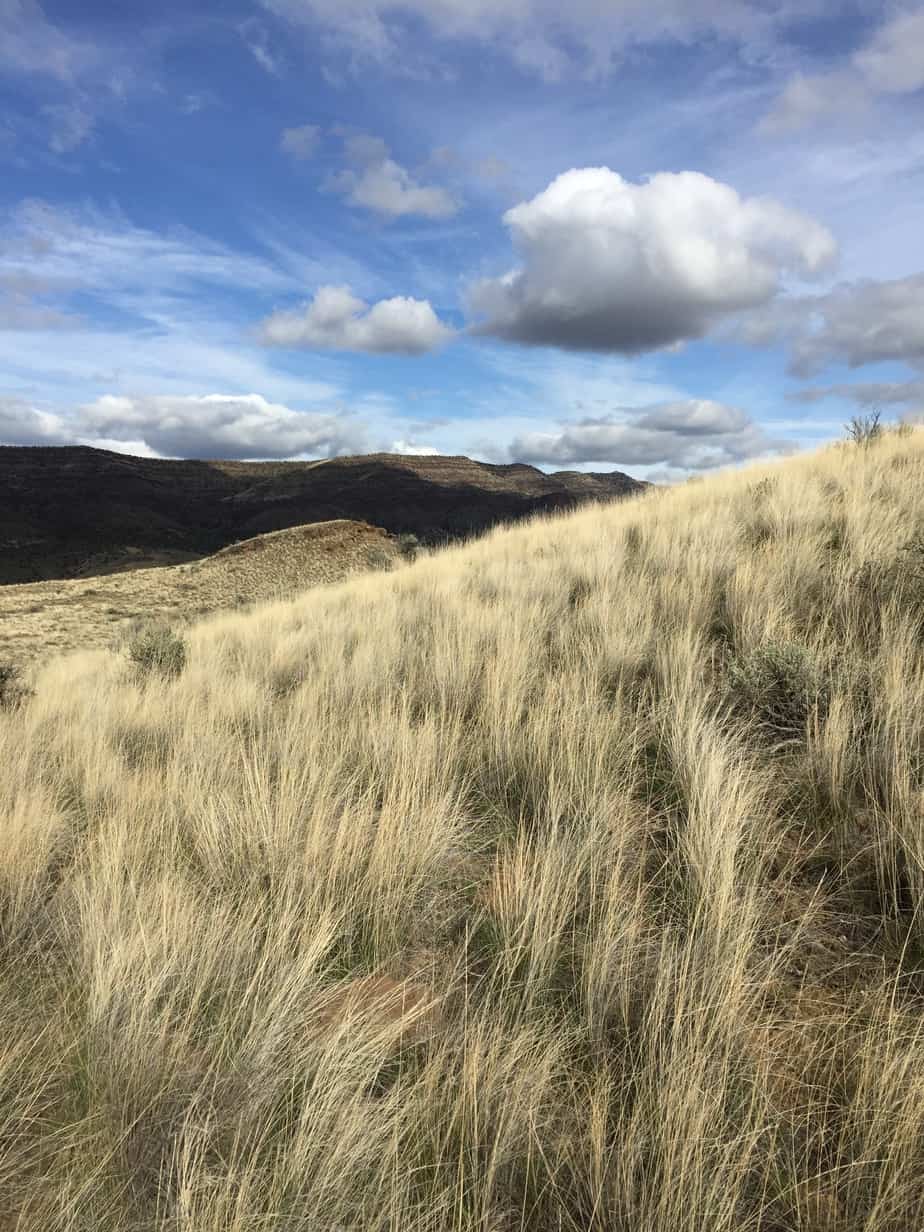
The Story Behind the Painted Hills
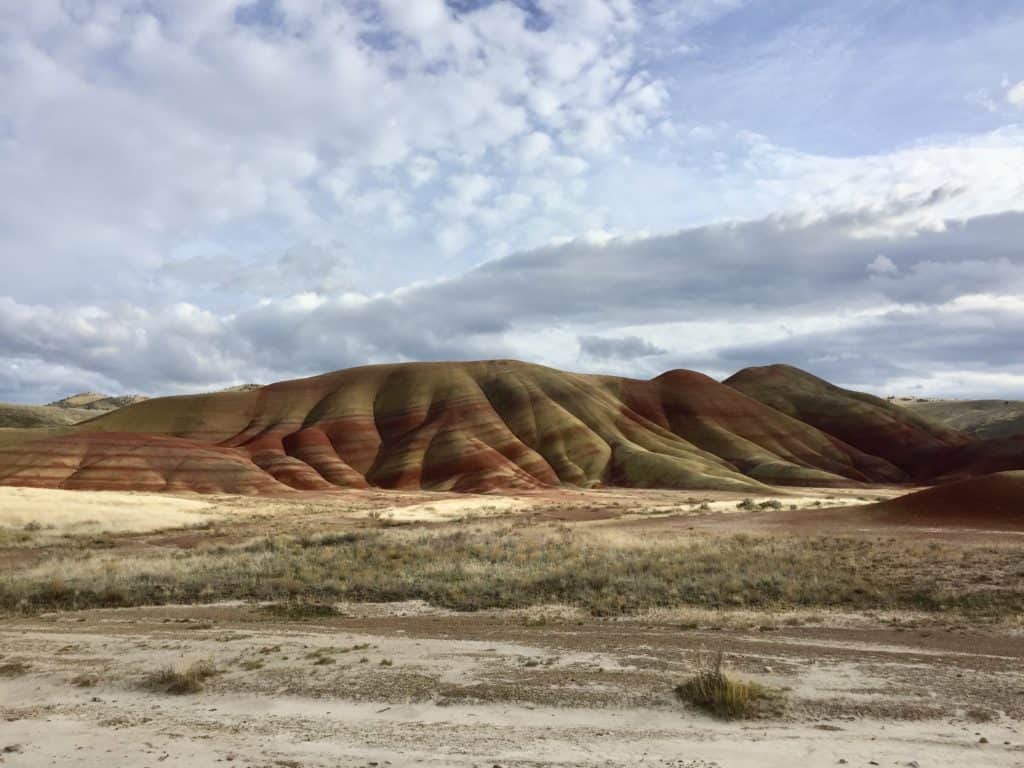
The Painted Hills are a masterpiece of the ages. The fossilized soils that compose the Hills tell the story of Oregon’s ancient past. These paleosoils (“old soils”) provide hallmarks of ancient climates. Different geological eras created different types of soil compositions, which lead to different hues of color.
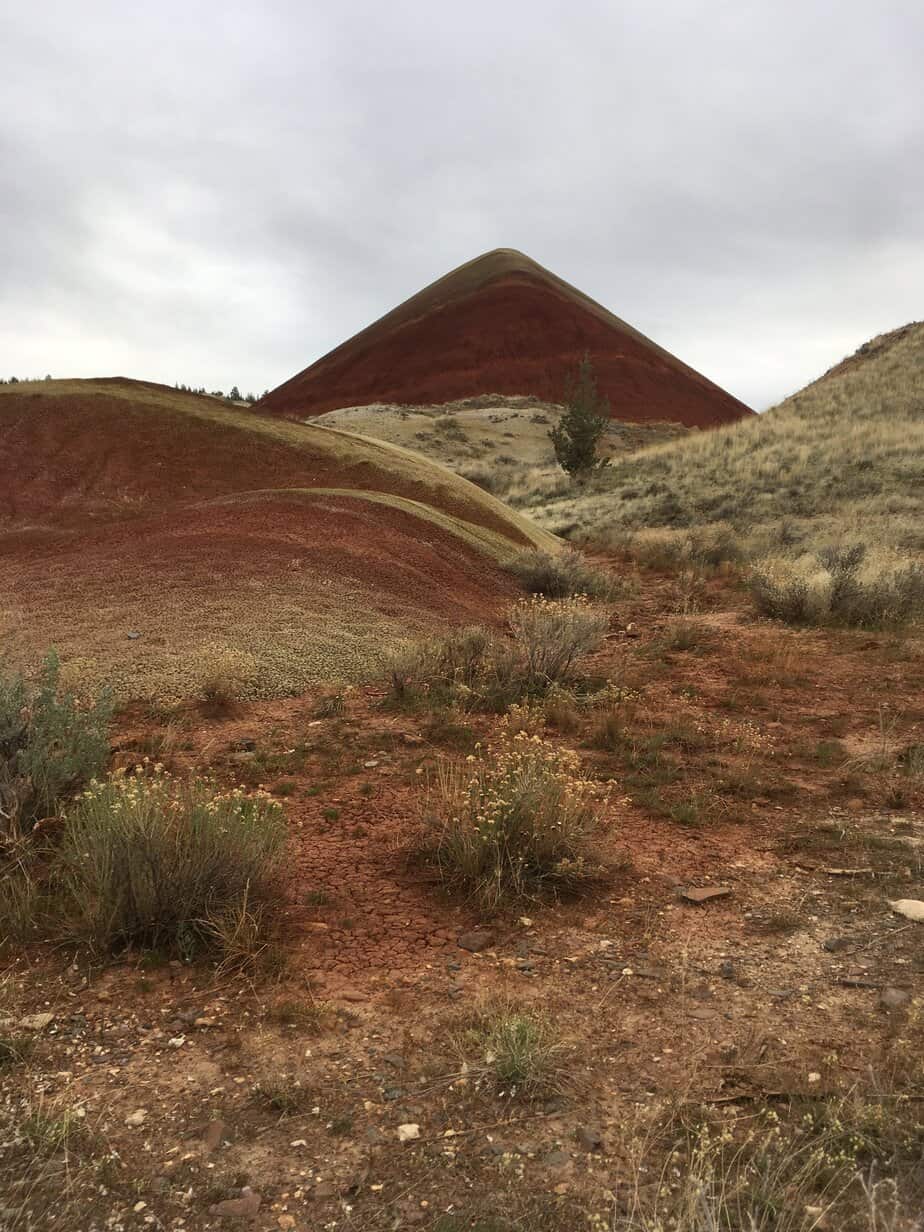
Reds of the Painted Hills testify to tropical periods when Oregon hosted crocodiles. Yellows formed in drier climes, at times when Oregon was much like the African Savannah.
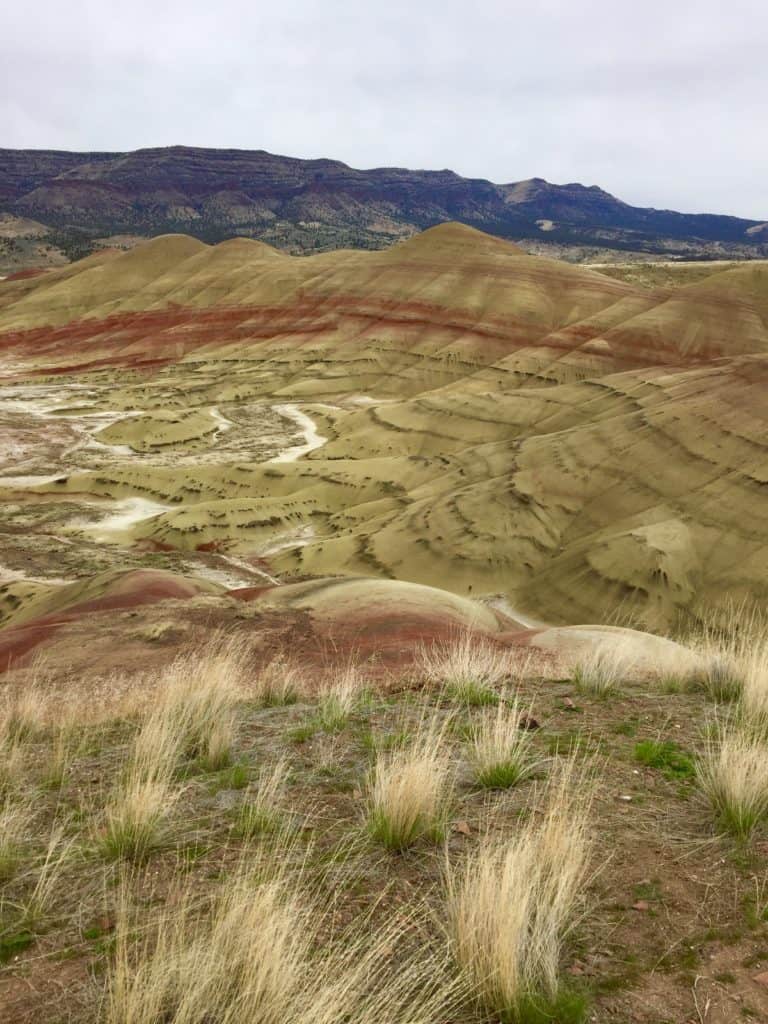
The Painted Hills Overlook Trail provides you with the best view of this ecological record. From the overlook you can easily see how the Painted Hills change color in a uniform and predictable manner.
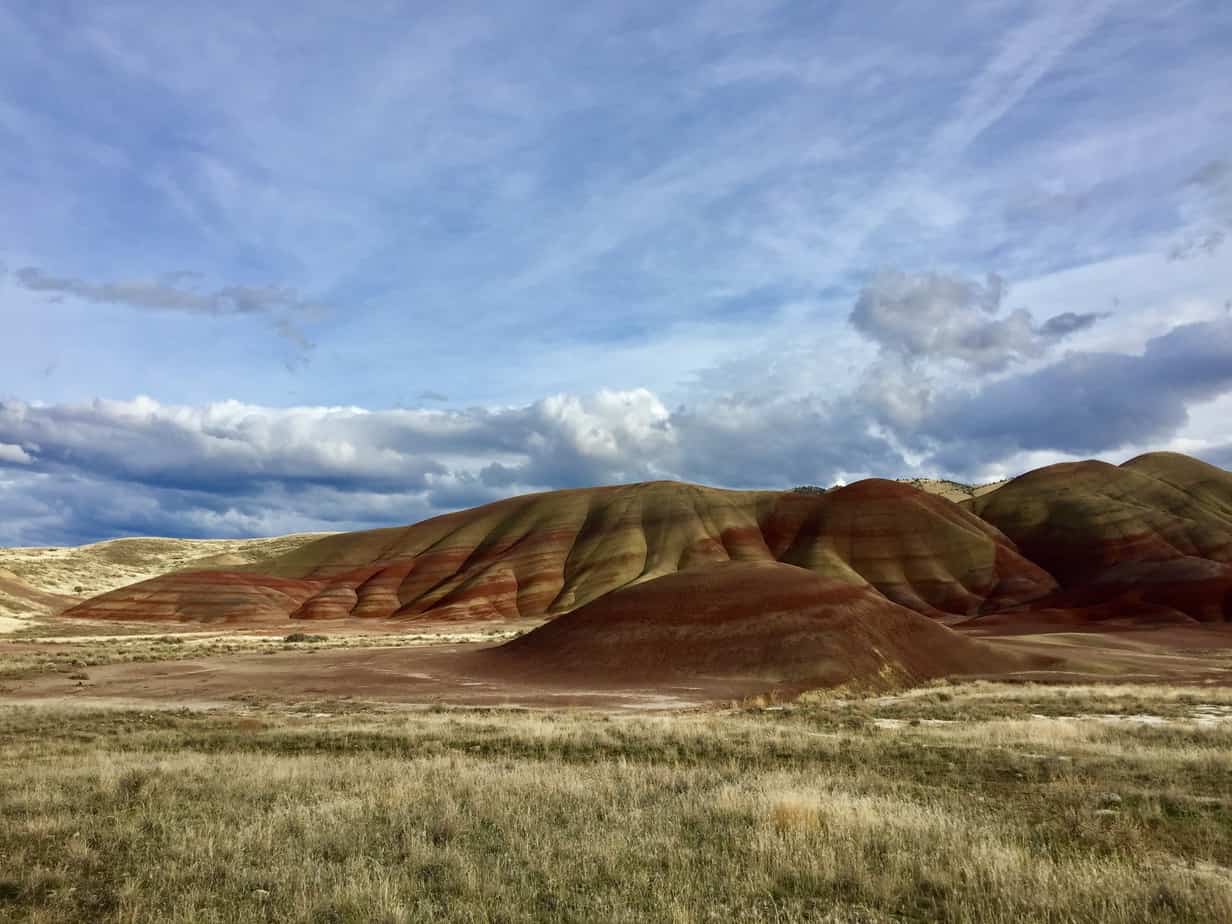
It’s easy to see the beauty and miss the profound power of this record. Every color change amounts to notable climactic and ecological shift in earth’s history. How many years go into the smallest band of color? The earth is astoundingly old.
Our Tips for a Great Painted Hills National Park Experience
Take Your Time
You could see the Painted Hills in one hour’s time, but we don’t recommend that at all. If anything it would be better not to go than to stop in, snap a photo, and scoot. We found that a three hour window gave us enough time to explore the park, take in the quiet beauty, and get all of the photos that we wanted.
In fact, we returned a second time during the week because the Painted Hills Unit was so breathtaking. It’s simply the best site in the entire monument, so give you and your family lots of space to enjoy the wonder.
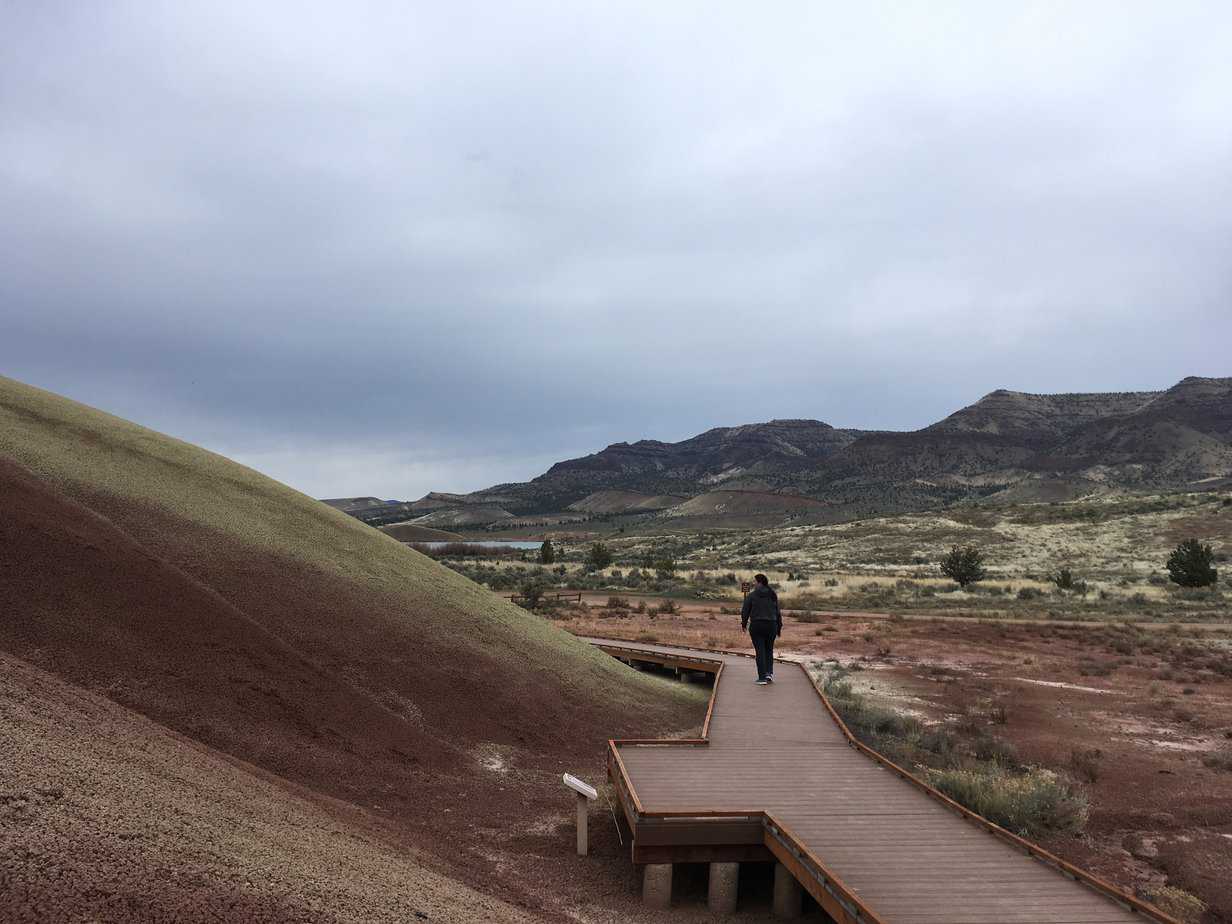
Double Check Your Directions
Three distinct units comprise the John Day Fossil Beds: The Painted Hills Unit, the Sheep Rock Unit, and the Clarno Unit.
If you type “John Day Fossil Beds National Monument” into your GPS and hit go, then you may end up at the visitor center located in the Sheep Rock Unit. The visitor center is cool, but it’s an hour drive from the Painted Hills Unit.
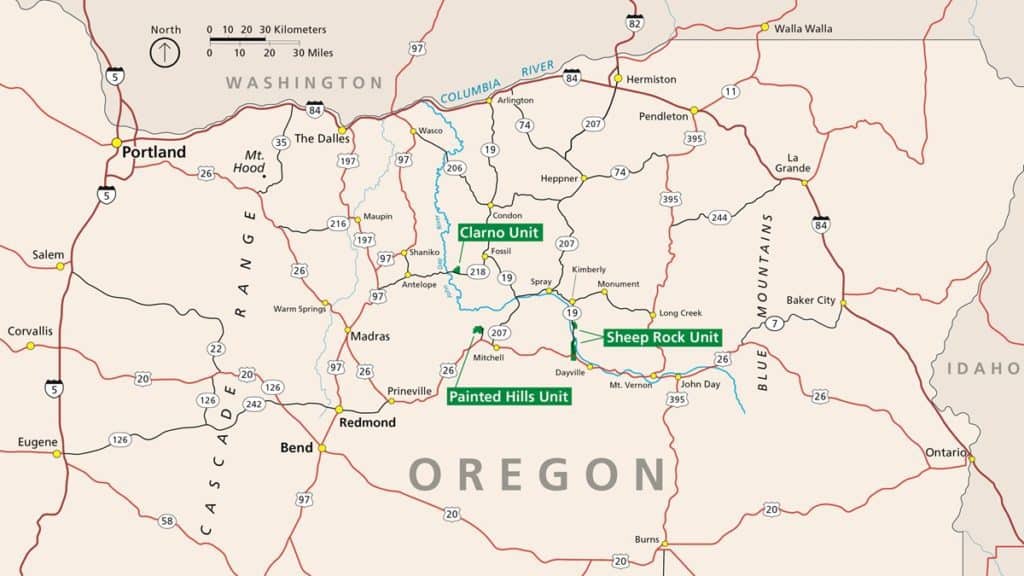
If you’re confused, just direct your GPS to Mitchell, Oregon. The town of Mitchell is right next to the Painted Hills Unit. Bottom Line: double check your map to make sure that you’re headed to the Painted Hills Unit.
Dress for Success
The Painted Hills are located in Oregon’s high desert, and offer little to no shelter from the elements. Snow and ice are common in winter and you can expect hot temperatures in summer months.
Visit during the shoulder months if you can, watch the weather, and dress in layers. We found fair weather and few crowds in April, but we happened to arrive only days after a snowstorm!
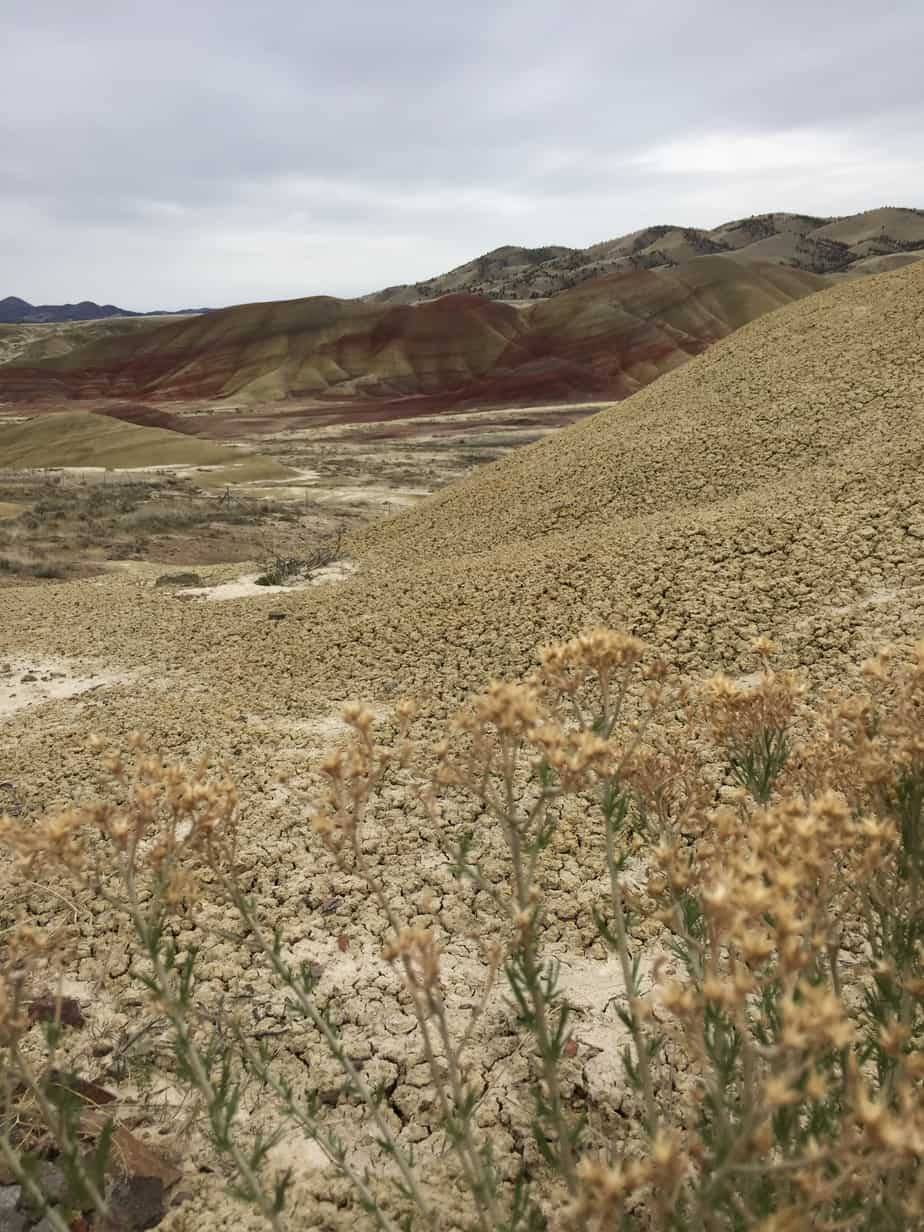
Come Prepared
Come prepared with what you’ll need for your visit to the Painted Hills. The John Day Fossil Beds are remote. The nearest national-chain amenities are an hour and a half away.
The Painted Hills are close to the town of Mitchell, but Mitchell is small—130 people, two stoplights. While this town is a fun place to visit, you’ll be hard pressed to find all the items on your list.
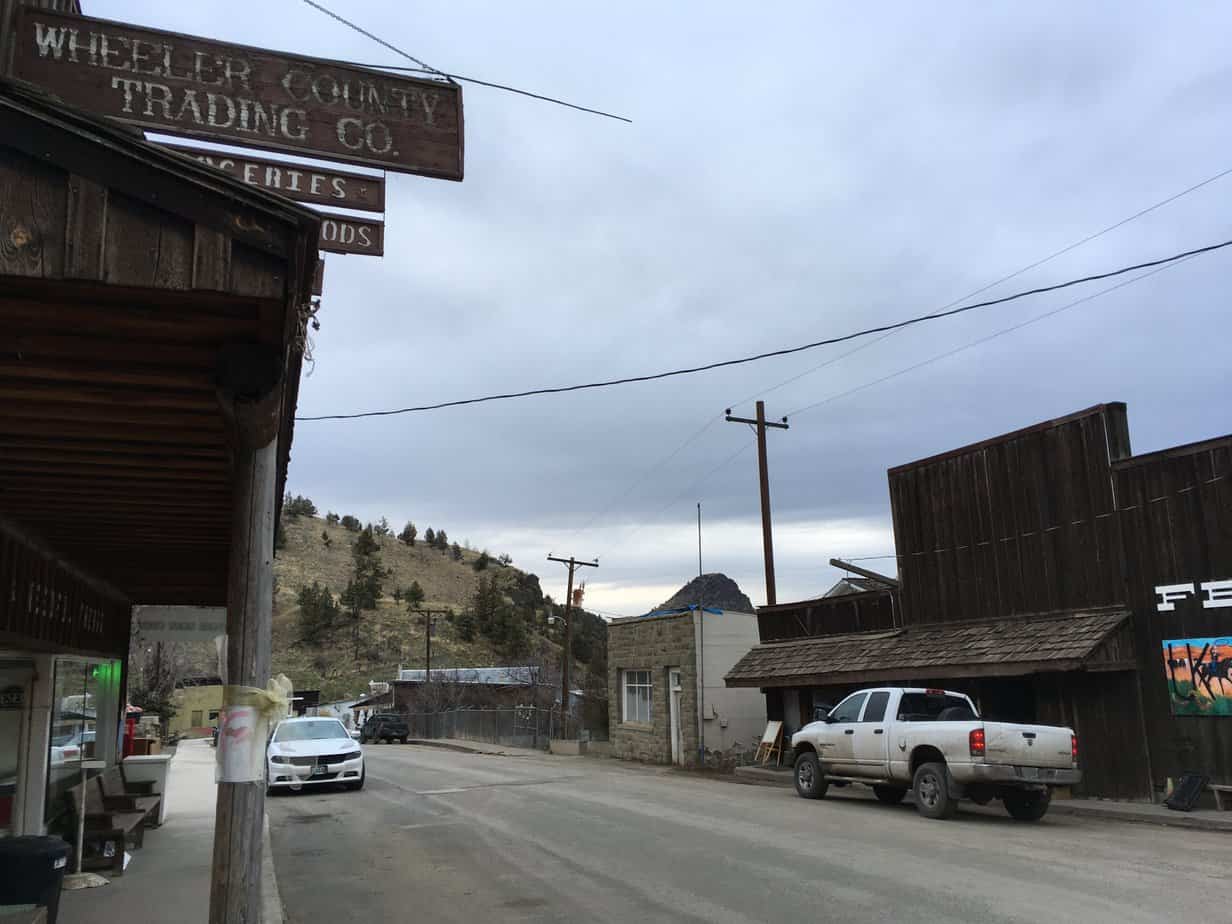
Best Hikes at the Painted Hills
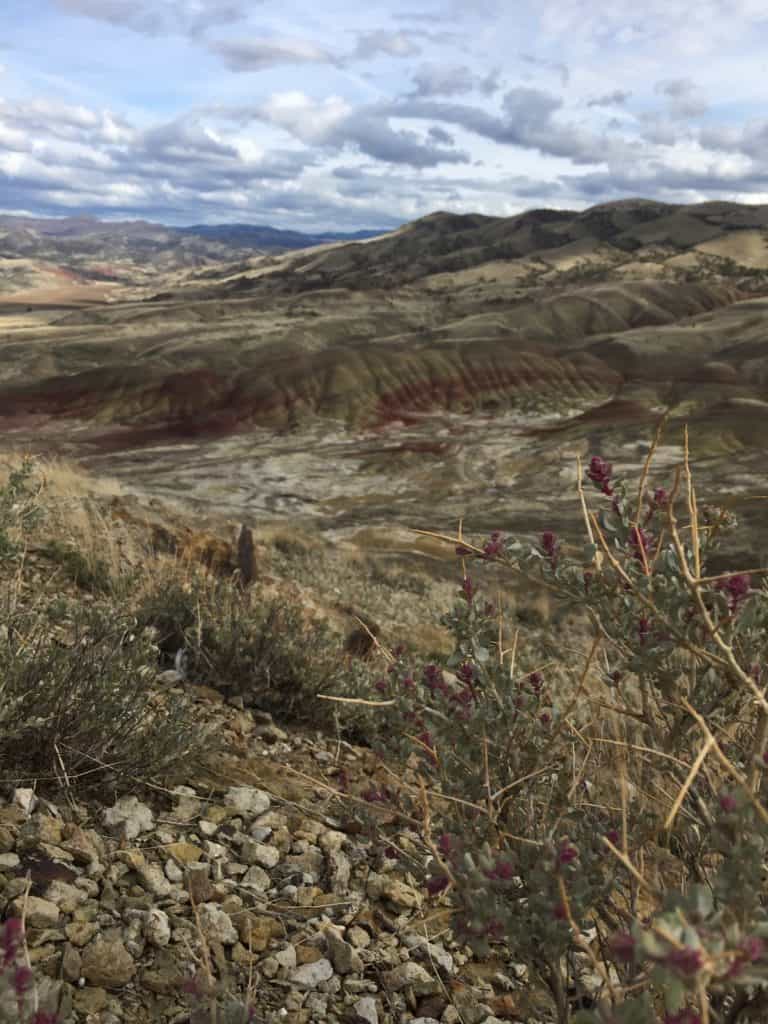
Nearly all of the hikes found at the Painted Hills Unit are worth your time. Here’s a quick summary of the four best hikes, and a hike to skip if you’re pressed for time.
Painted Hills Overlook Trail (Rating 5/5)
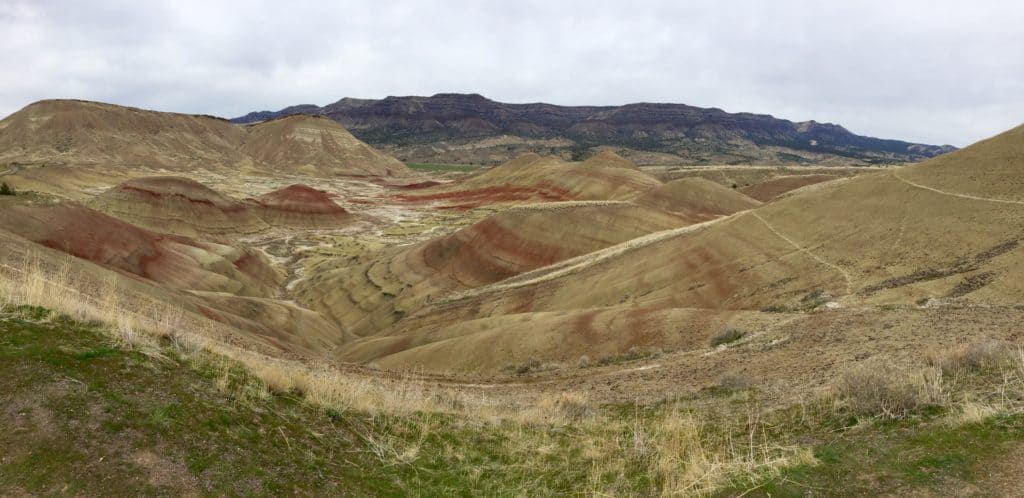
I already mentioned this trail above (See Story Behind the Painted Hills), but it’s worth stressing that this tiny trail is a natural starting point for your visit. The Painted Hills Overlook Trail offers the best views of the unit’s best set of hills.
The fantastic views set the tone for the whole experience and interpretive signs give a good opportunity to understand and appreciate the Painted Hills.
Carroll Rim Trail (Rating: 5/5)

Carroll Rim is hands-down the best hike at the Painted Hills Unit, and may be the best hike of the entire John Day Fossil Beds National Monument. The trail is 1.6 miles long round trip and gradually brings you up to the top of Carroll Rim, a ridge which overlooks the Painted Hills.
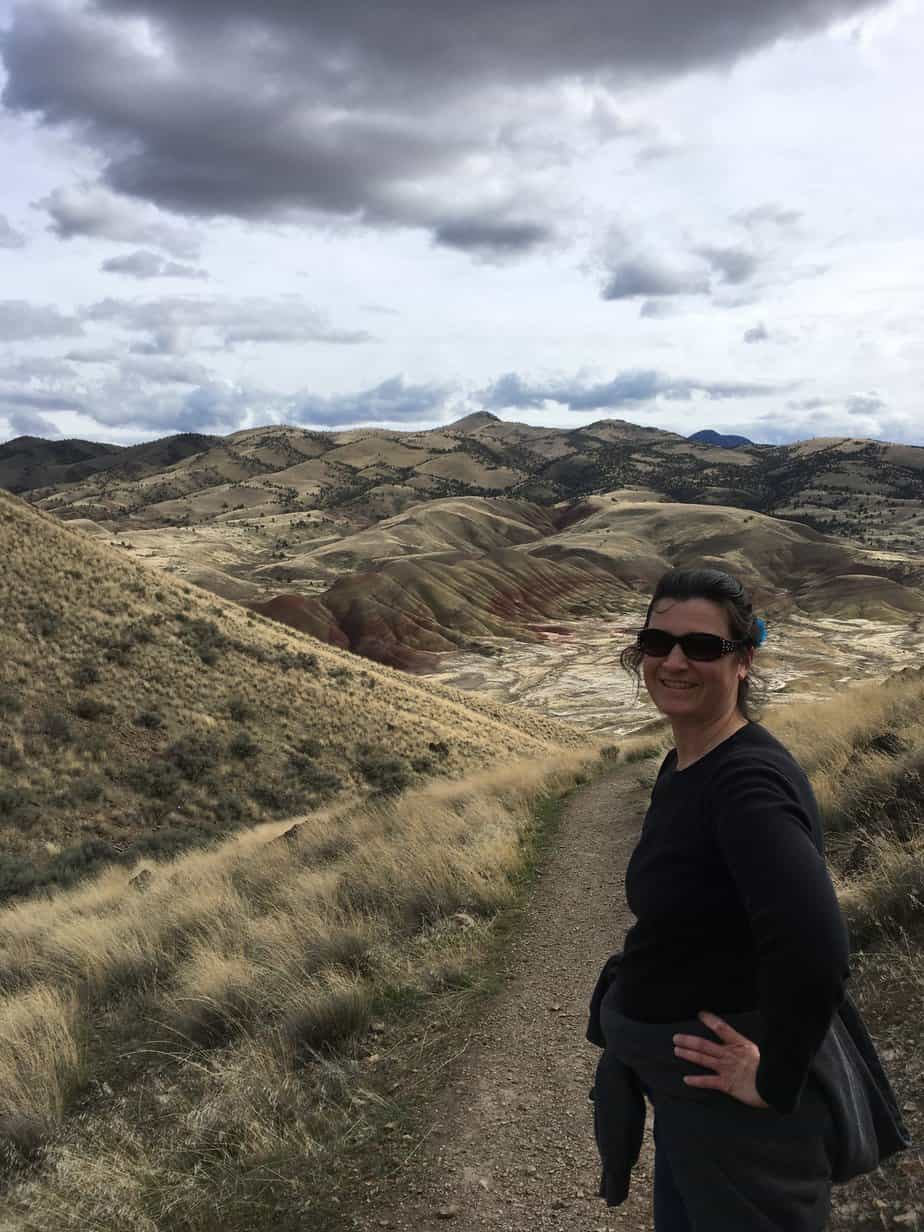
We found this trail enthralling. Photo opportunities abound, offering plenty of material for creativity. The summit offers a 360 degree view of the entire countryside. We spent nearly an hour sitting at the top of the world, listening to the wind and watching the hawks circle the skies.
@dinkumtribe 360-degree view from the top of Carroll Rim at the Painted Hills, Oregon. #paintedhillsoregon #visitoregon #oregonexplored #pnwonderland ♬ Paper Birds (3 min) – Jordan Halpern Schwartz
Carroll Rim has a lot going for it if you’re hiking with a family. For one, the trail is straightforward with only one way up and one way down. The 400 foot elevation gain is not difficult for anyone in relatively good health.
Best of all, the summit is quite broad, so the overlook is relatively safe with adequate adult supervision. Come prepared for strong winds.
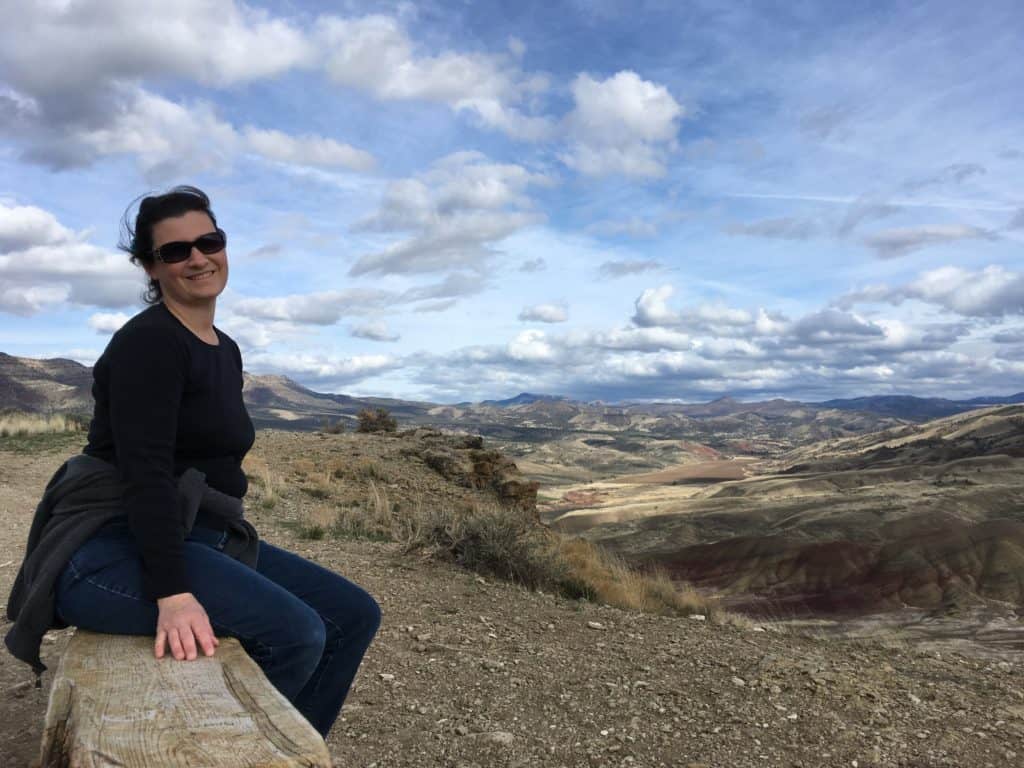
Carroll Rim offers the best view of the Painted Hills and their surrounding countryside; don’t miss it!
Painted Cove Trail (Rating 5/5)
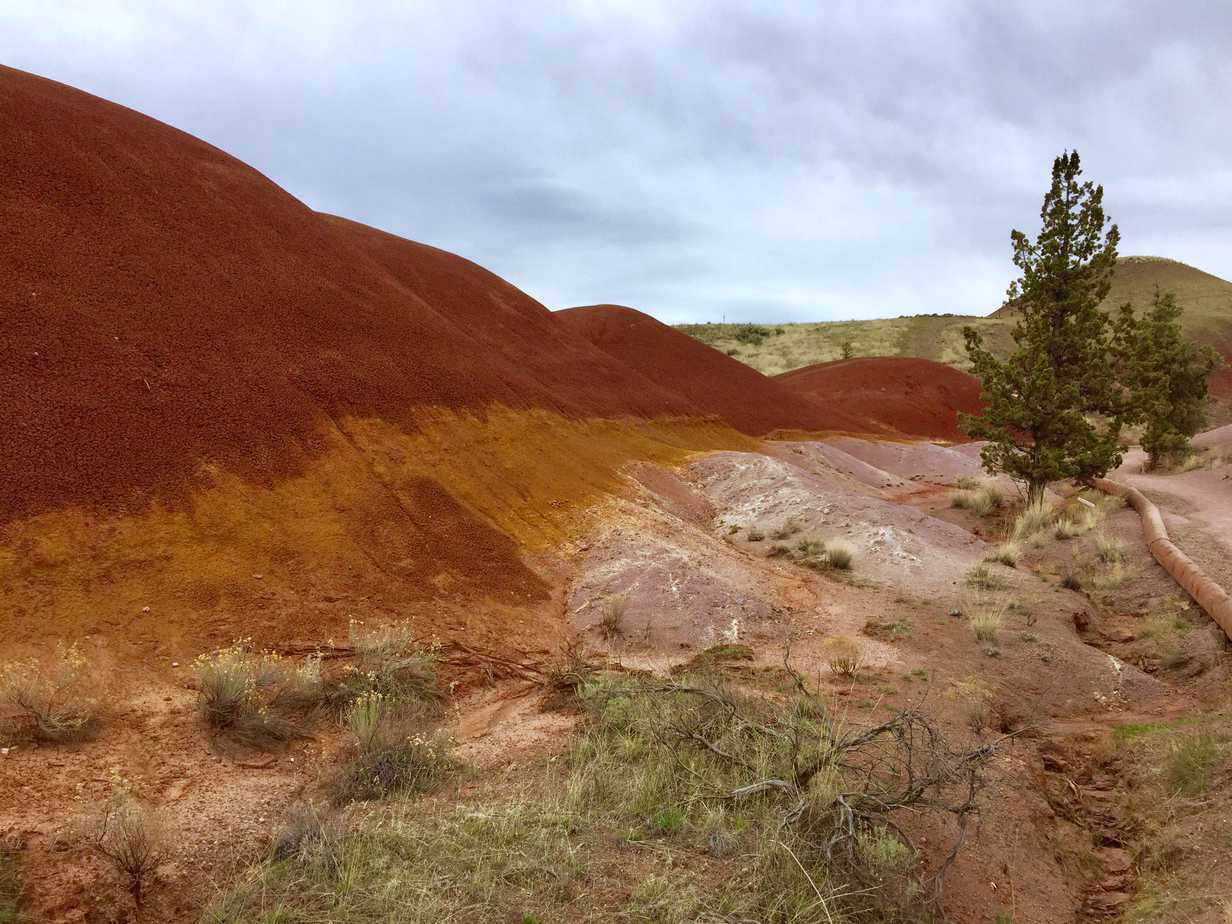
Painted Cove is an equal contender with Carroll Ridge. The truth is that these two top-notch trails deliver equal value in different ways. What Carroll Ridge gives in vistas, Painted Cove gives in detail.
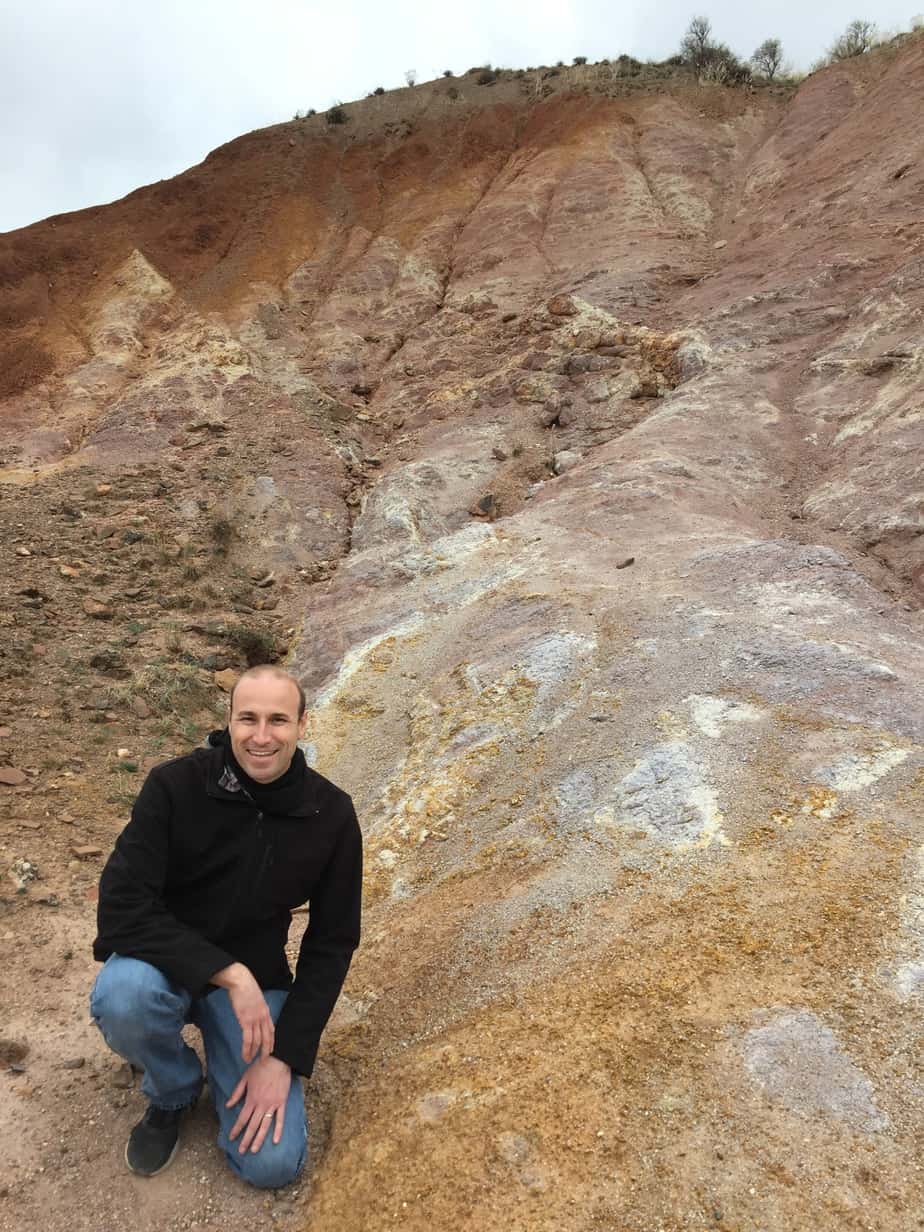
Painted Cove is only 0.25 miles round trip, but it will take you twenty minutes or longer to get through it. Incredibly rich colors saturate the Cove. Some of these colors transition, intersect, or explode in remarkable and unexpected ways.
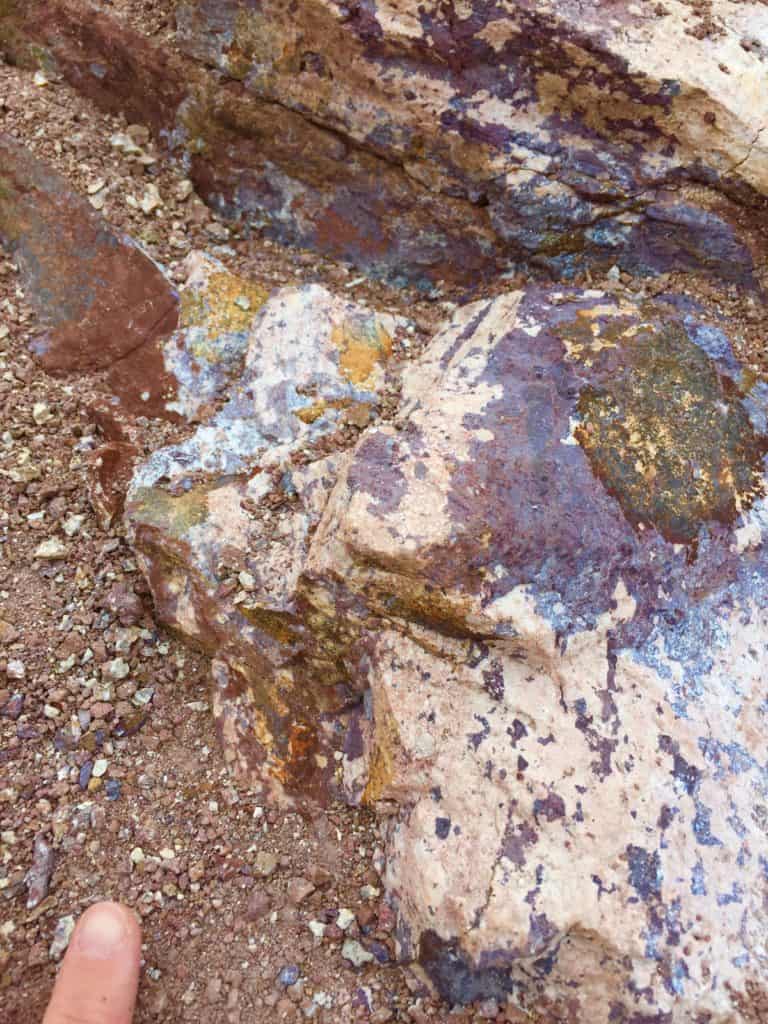
The Painted Cove is also valuable because it affords one of the closest views of the Painted Hills. A level boardwalk allows you to walk amidst the actual hills and observe the soil from a perspective that you don’t get at the Painted Hills Overlook Trail.
Walking among the Painted Hills and seeing the phenomenon up close is an unforgettable experience.
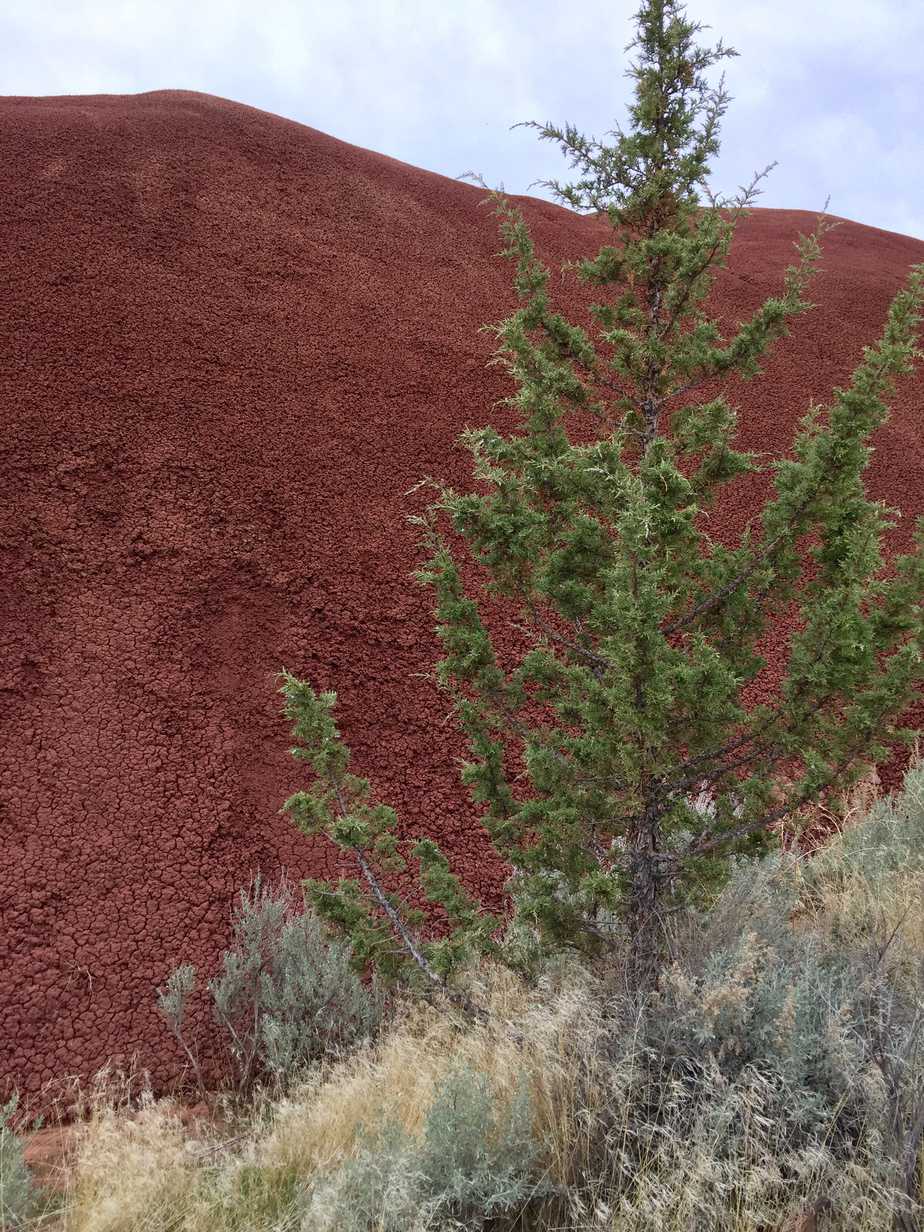
Red Scar Knoll Trail (Rating 3/5)
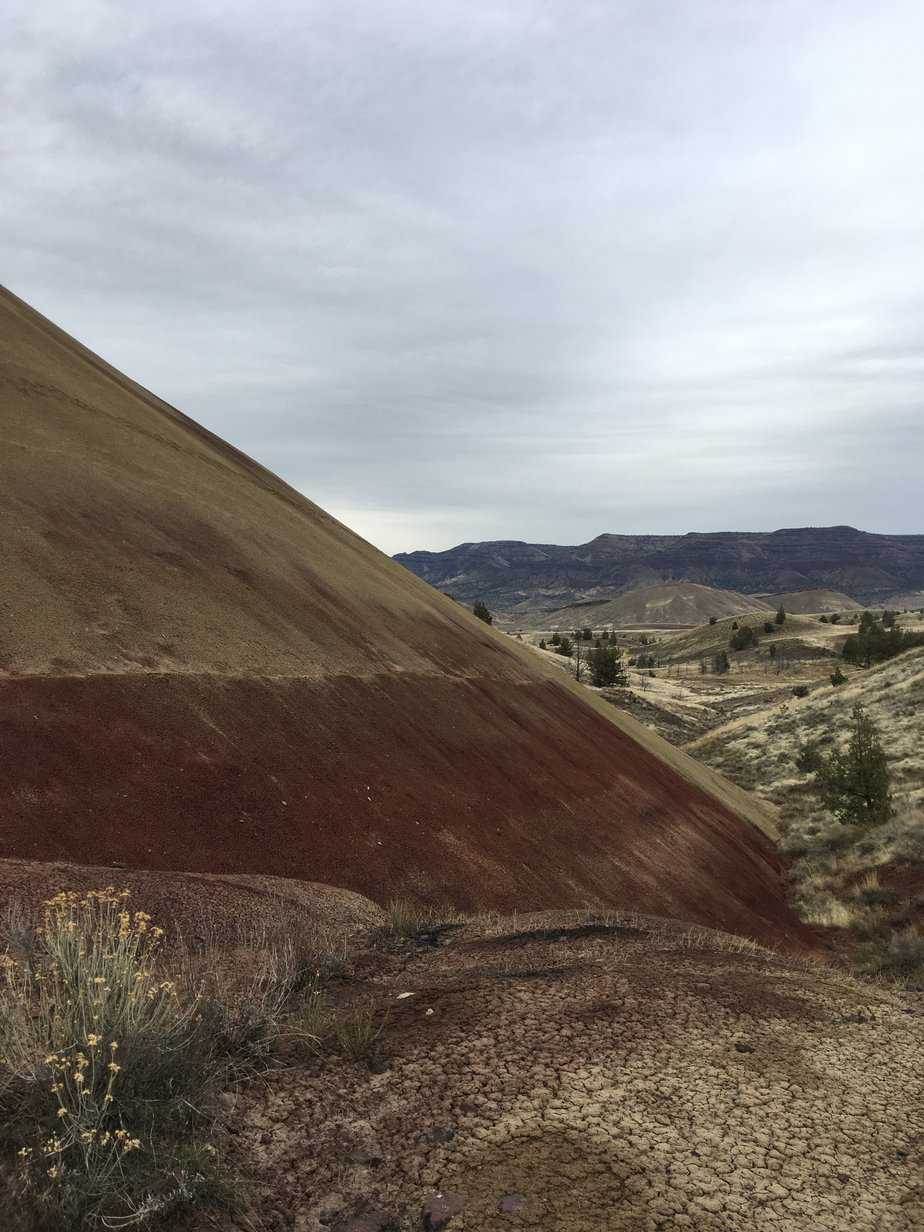
Sometimes called Red Hill trail, the Red Scar Knoll Trail is another close-up trail within the Painted Hills Unit. The 0.25 mile long trail brings you up to Red Scar Knoll, a pyramidal shaped painted hill. The deep colors and bizarre shape excite curiosity and creativity.
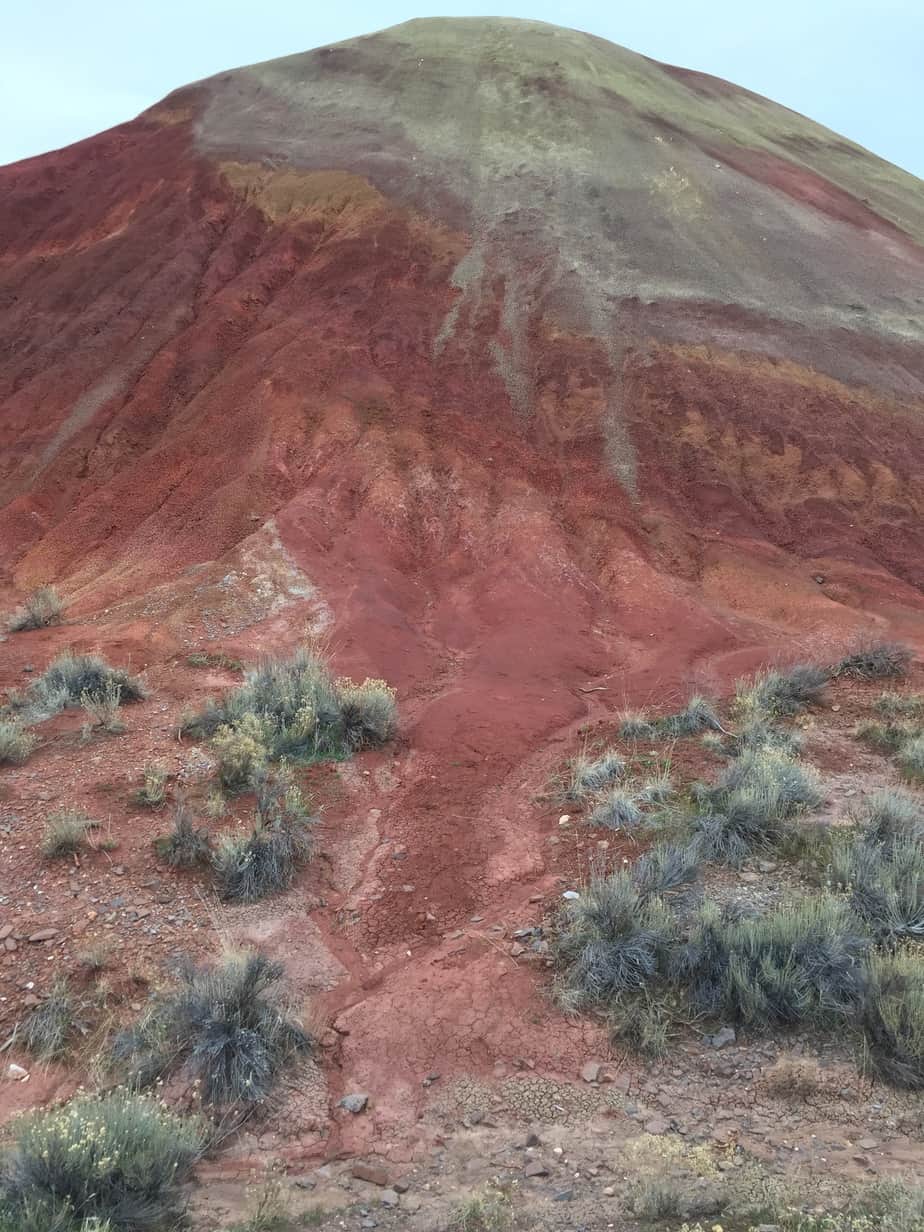
Leaf Hill Trail (Rating: 1/5)
Leaf Hill Trail has little to see and almost nothing to do. The trail highlights the place where paleontologists discovered a fossil-rich formation known as the Bridge Creek Formation. The Bridge Creek formation is important in the study of prehistoric plant-life.
Unfortunately, the area is entirely fenced off. So the overall experience amounts to an interpretive sign and a pile of dirt that you can’t touch. You and your children will find a better experience at the Visitor Center, which is also known as…
#2 Thomas Condon Paleontology Center
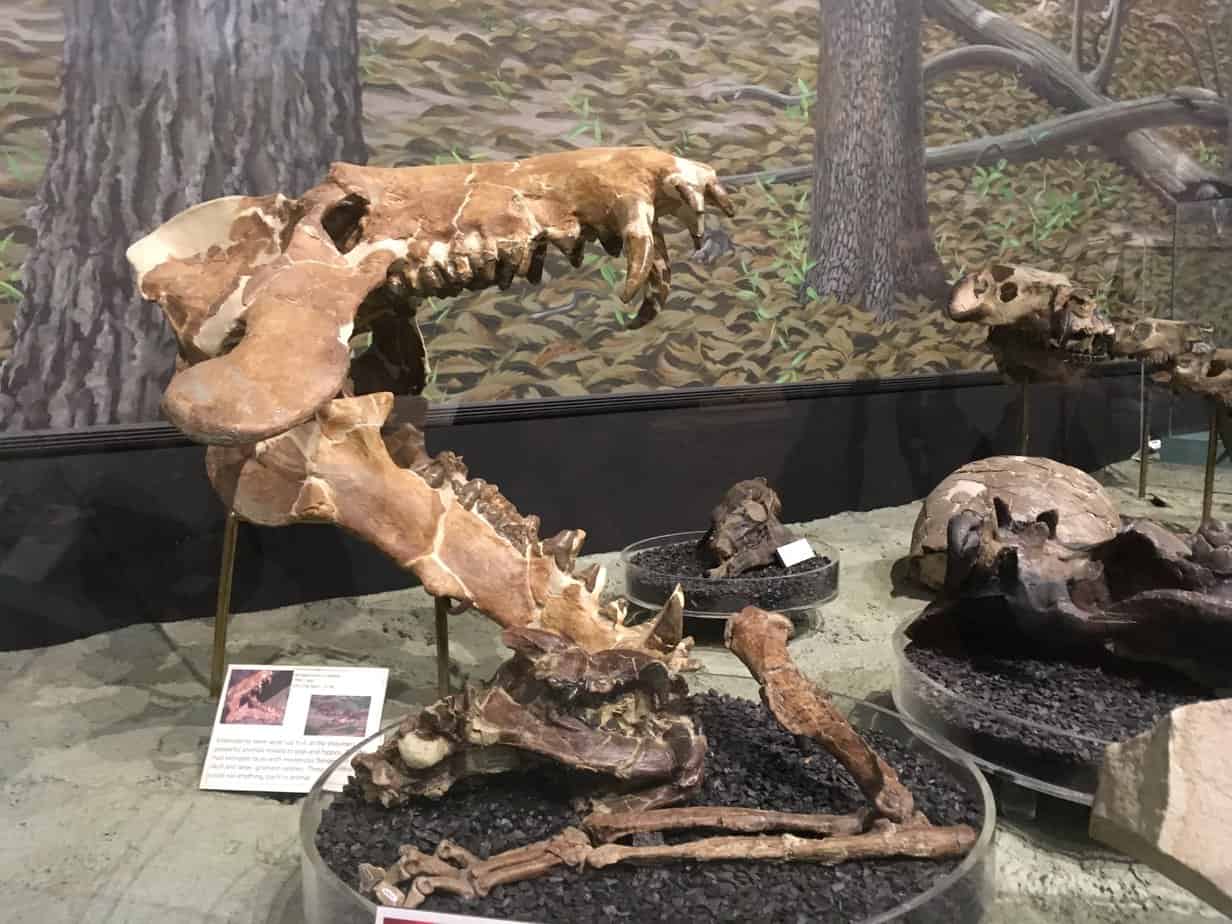
The Thomas Condon Paleontology Center is a visitor center and science museum in one place. Extensive fossil exhibits, hands-on displays, and life-size depictions make this place a must-see school stop.
The visitor center is named after Thomas Condon, a frontier minister who first discovered the fossil beds in the 19th century. Condon advocated for the study and preservation of John Day Fossil Beds.
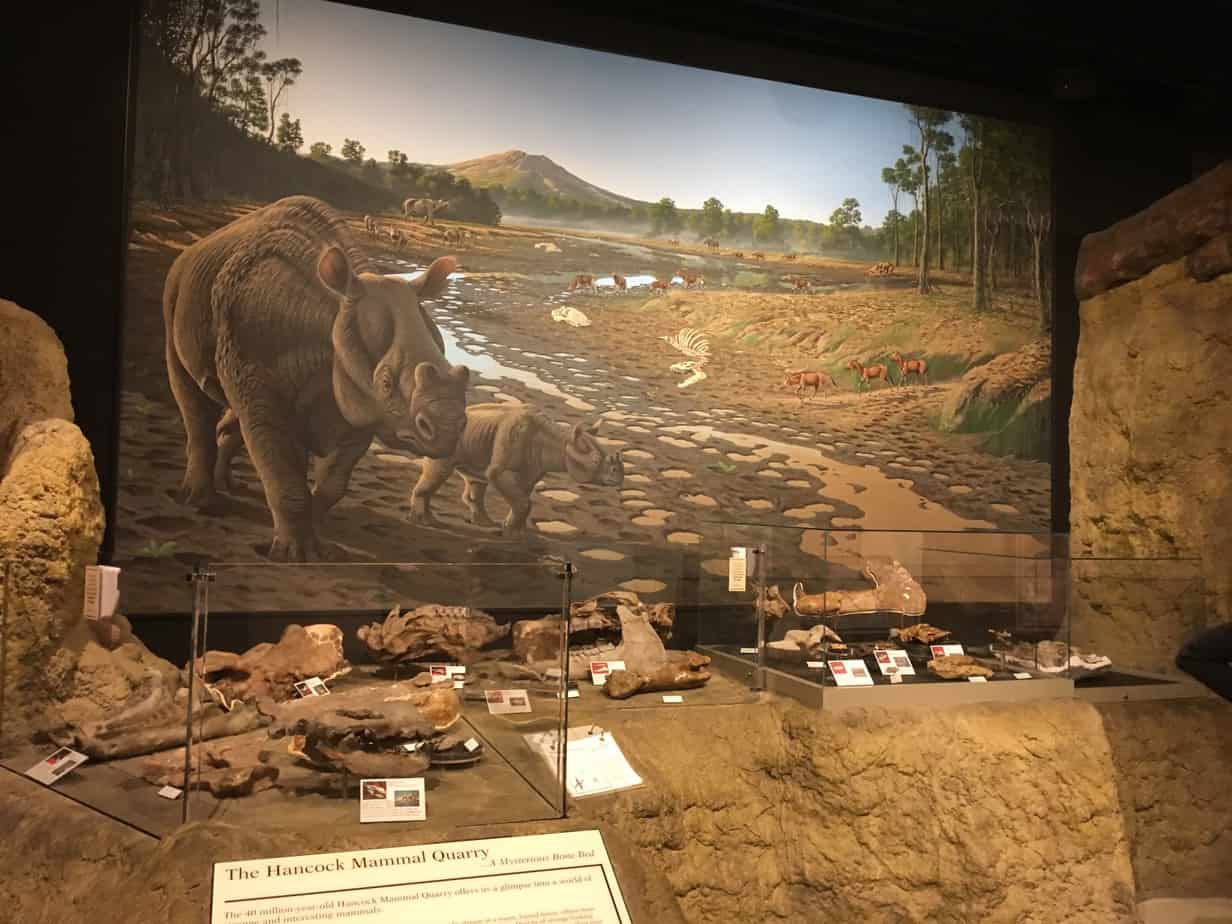
Great location and exhibits
The top-notch interpretive center is ideally located across the valley from Sheep Rock. Children can peer through a telescope to survey the stacked fossil layers that compose Sheep Rock. Then they can learn about those layers in sequence in the interactive visitor center.
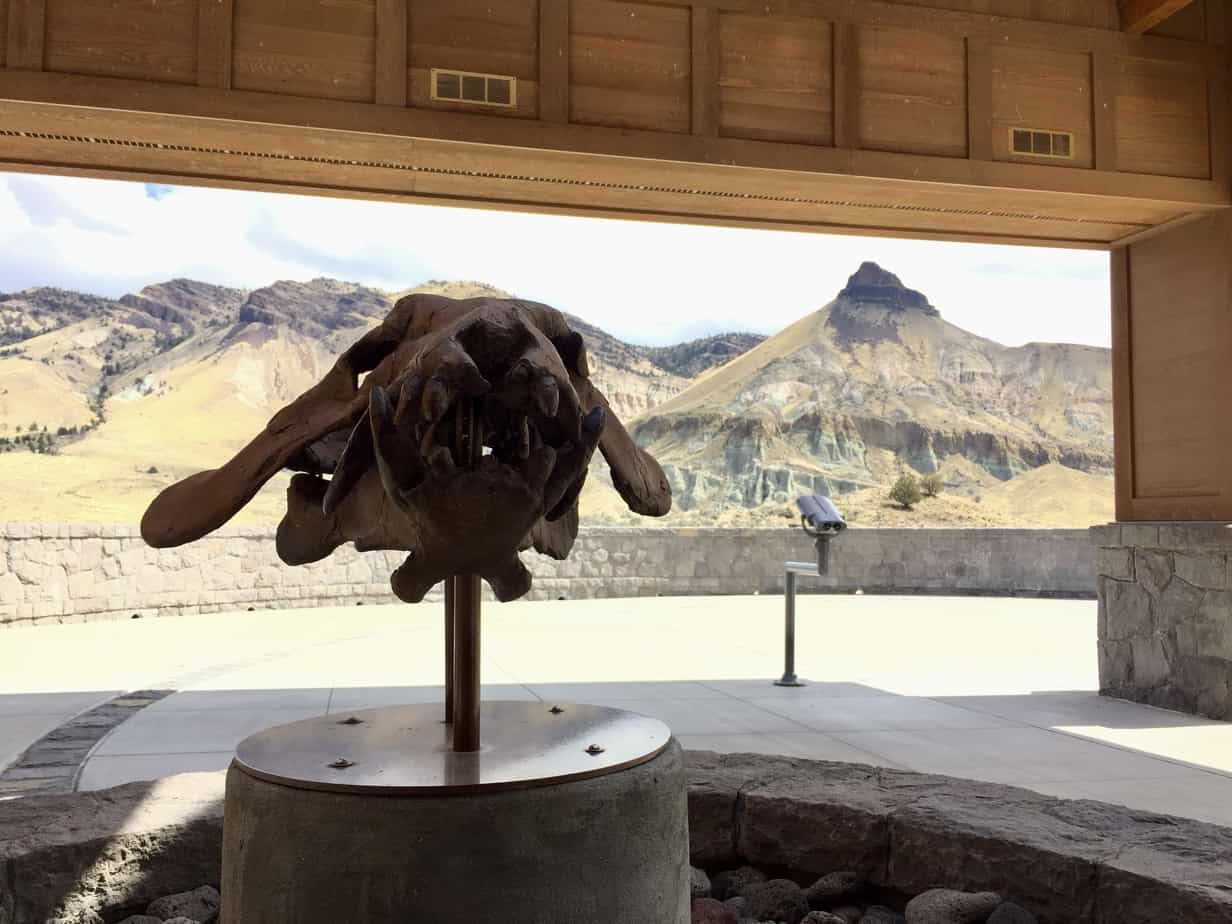
To walk into these displays is to enter a world that is both strange and familiar. Buffalo size pigs with fearsome teeth, tiny three-toed horses, and strange bear-dog predators populate an ancient Oregon. The many worlds of the John Day Fossil Beds takes you well beyond the Wooly Mammoths, Saber Tooth Tigers, and Giant Sloths that dominate our conceptions of Cenozoic life.
Paleontology Lab and Jr. Ranger Program
The center’s working lab offers you the opportunity to see paleontology in action. You and your children can watch experts as they carefully, clean and examine fossil specimens and incorporate them into current research.
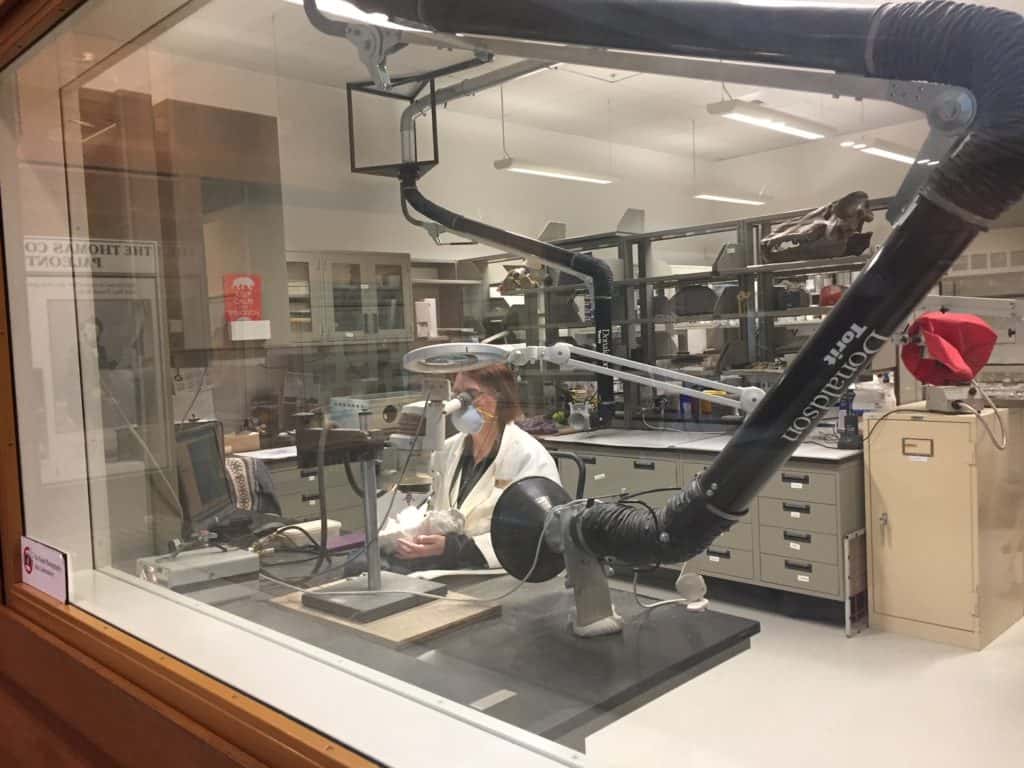
Students can also benefit from the Monument’s Junior Ranger Program. Like all NPS sites, this Monument’s Jr. Ranger Program gives children the opportunity to challenge themselves through age-appropriate activity books and programs. The monument’s website provides additional ways to discover and explore via online resources.
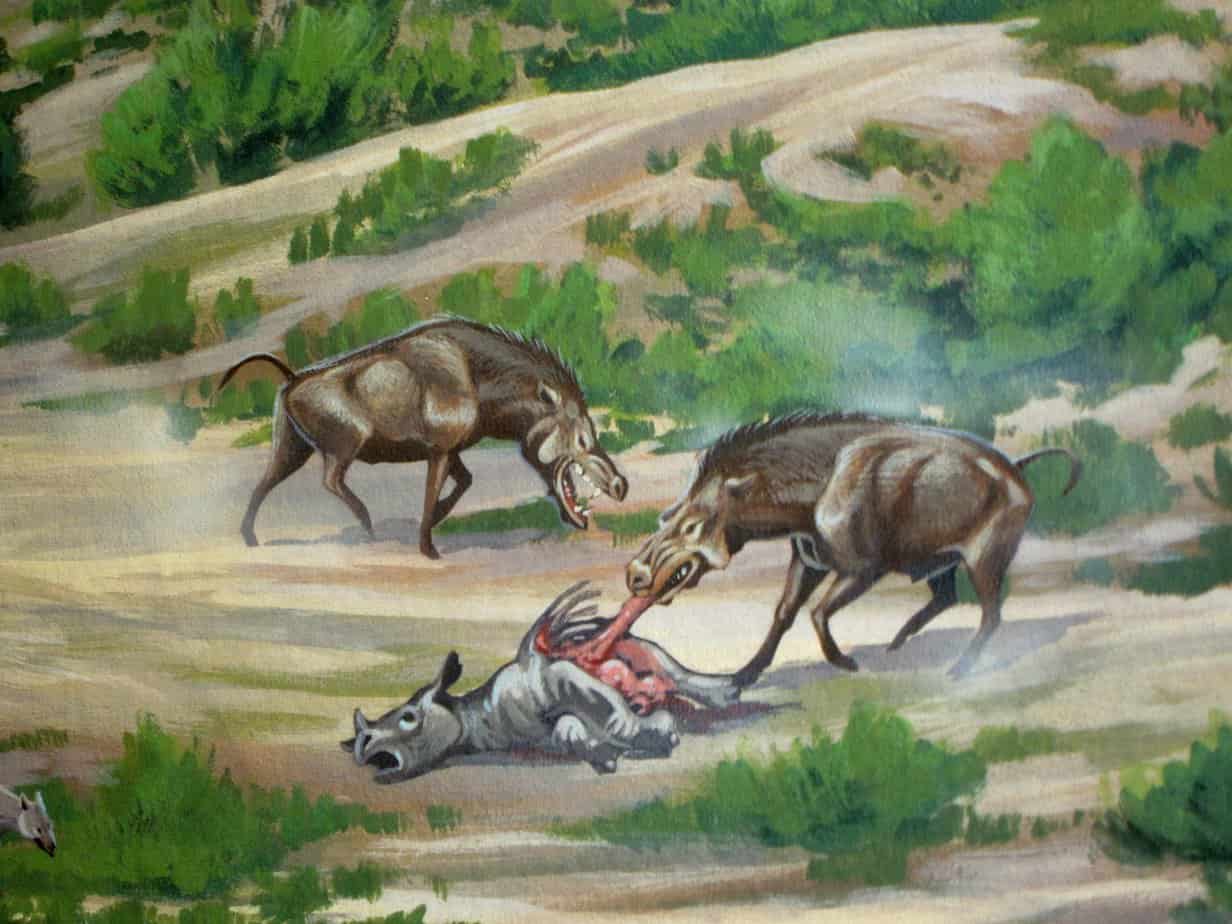
The Thomas Condon Museum of Paleontology is a center worthy of its remarkable subject, and is well worth your time.
#3 The Blue Basin
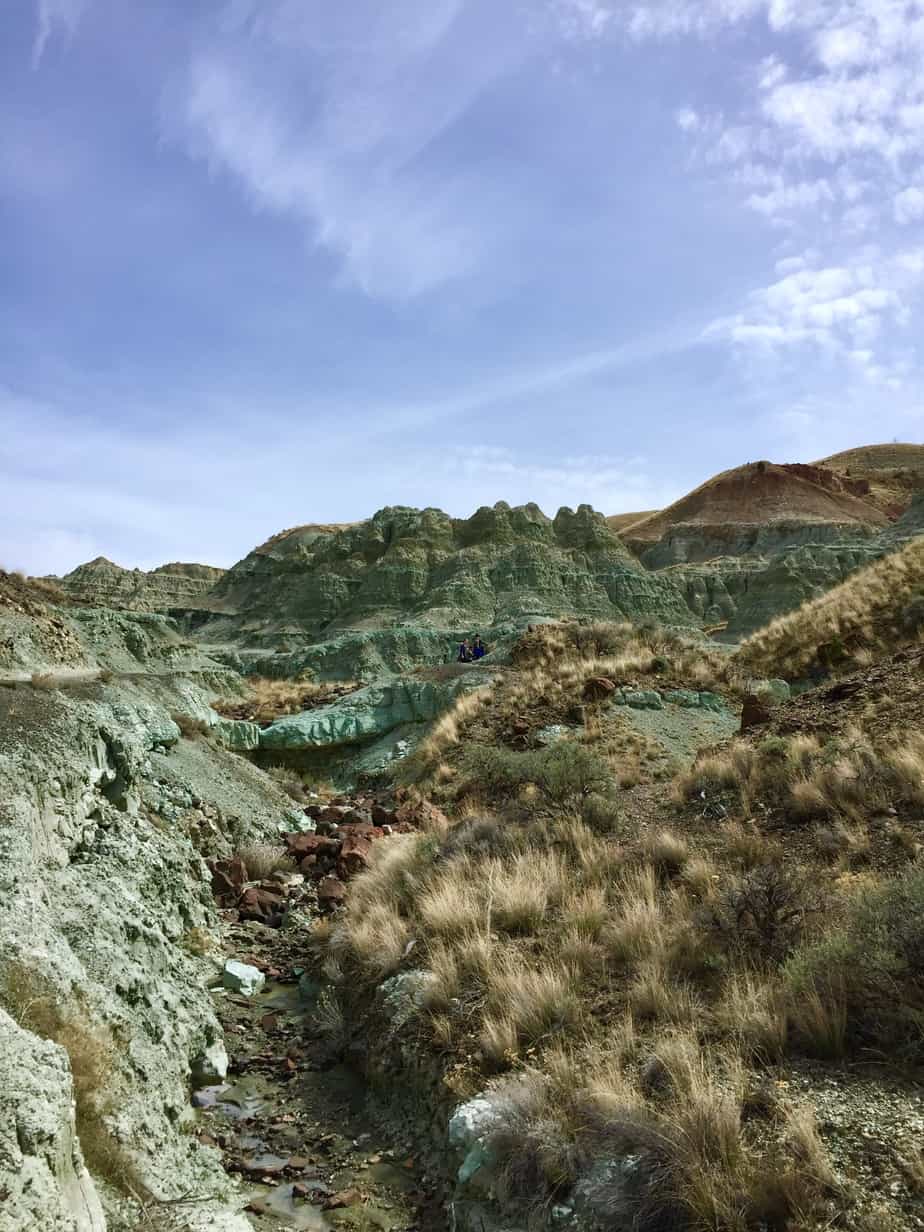
The Blue Basin is fossil-rich formation composed of compressed volcanic ash. The real draw of the basin, however, aren’t so much the fossils as the badlands that hold them. The eroded hillsides have a greenish hue, giving the location an otherworldly feel.
The Blue Basin is located in the Sheep Rock Unit, about three miles north of the Thomas Condon Museum of Paleontology.
Blue Basin Trails
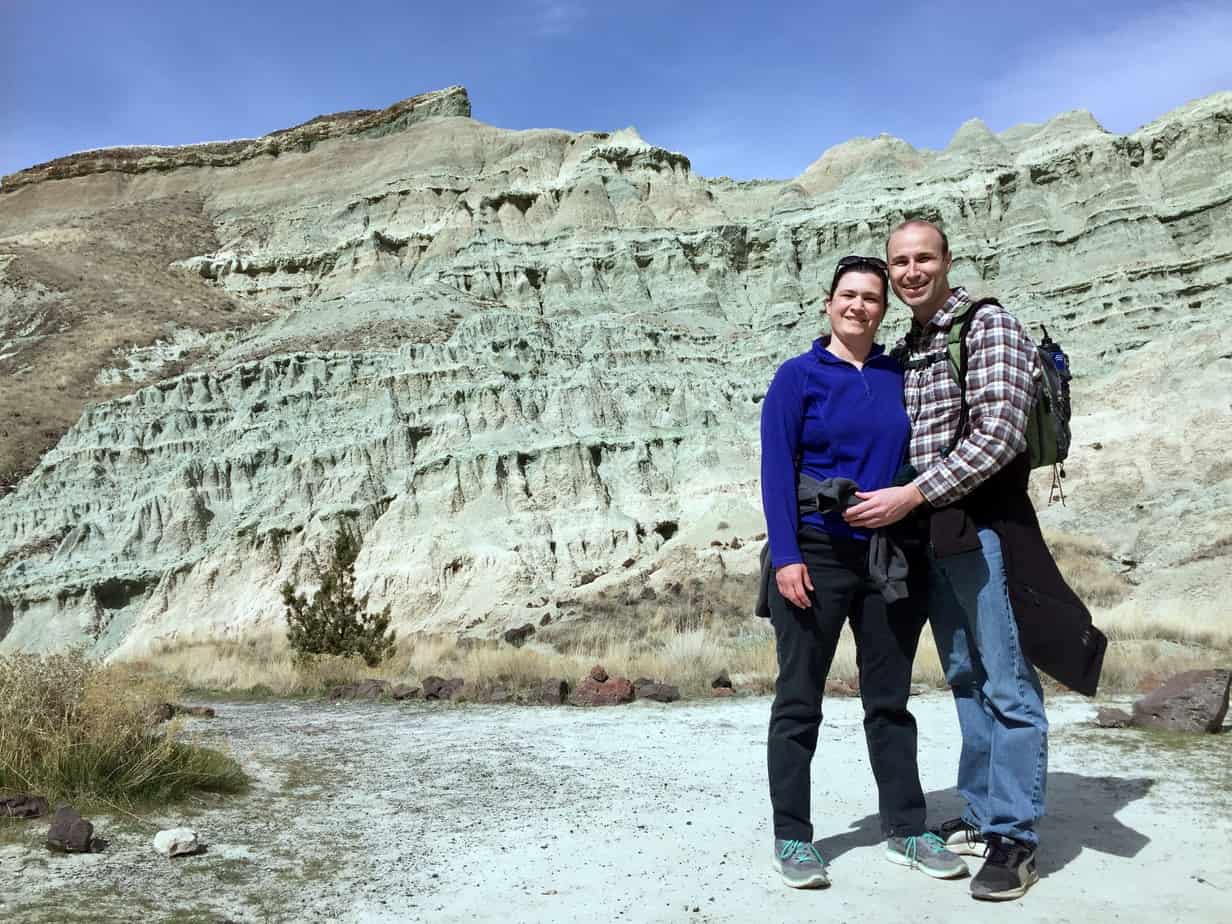
Two trails offer access to the Blue Basin, and the trails give two different experiences.
Island in Time (Rating 5/5)
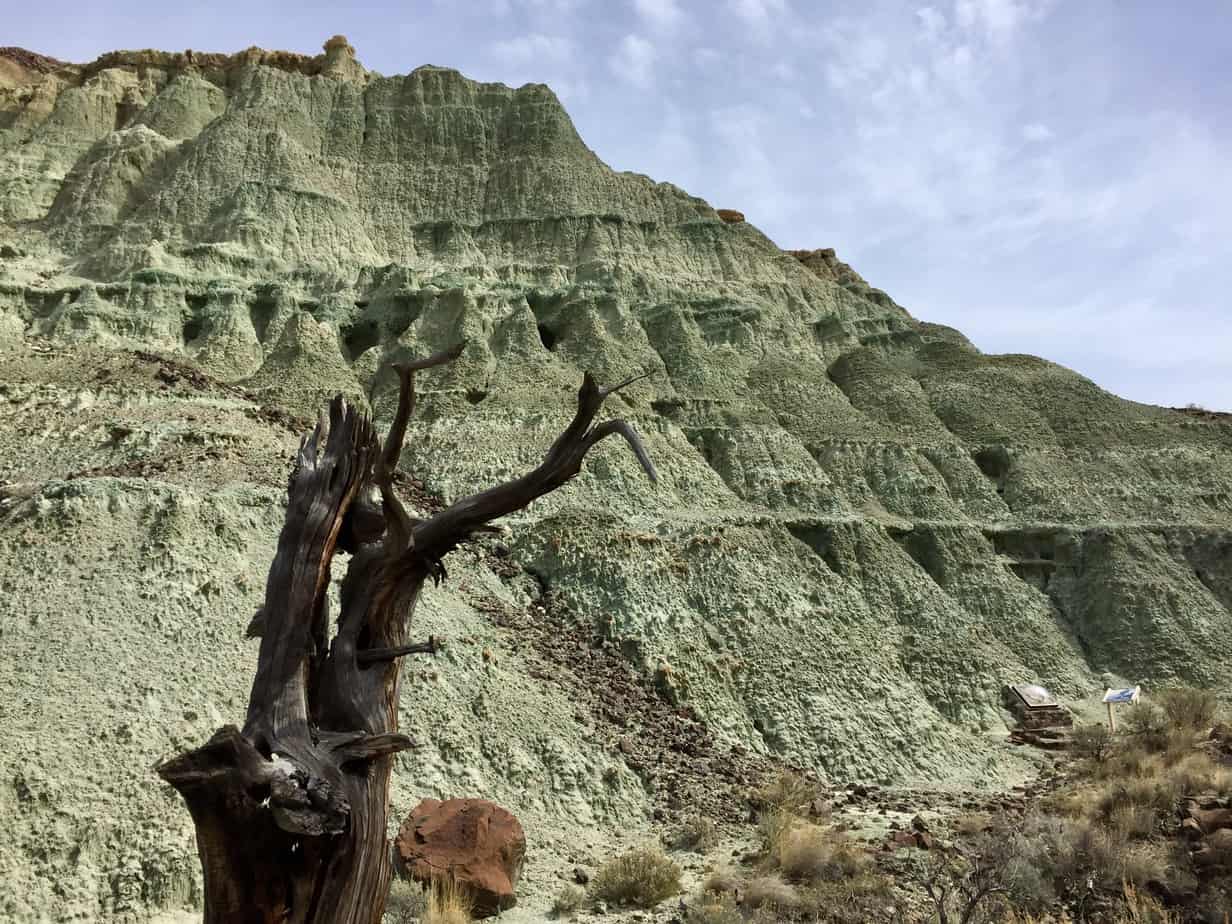
The Island in Time trail is the most kid-friendly of the two trails. The easy trail is 1.3 miles round trip and takes you in among the bizarre landscape of the Blue Basin. Interpretive signs and fossil displays explain the contributions of the Blue Basin and its Turtle Cove Formation to our understanding of ancient life.
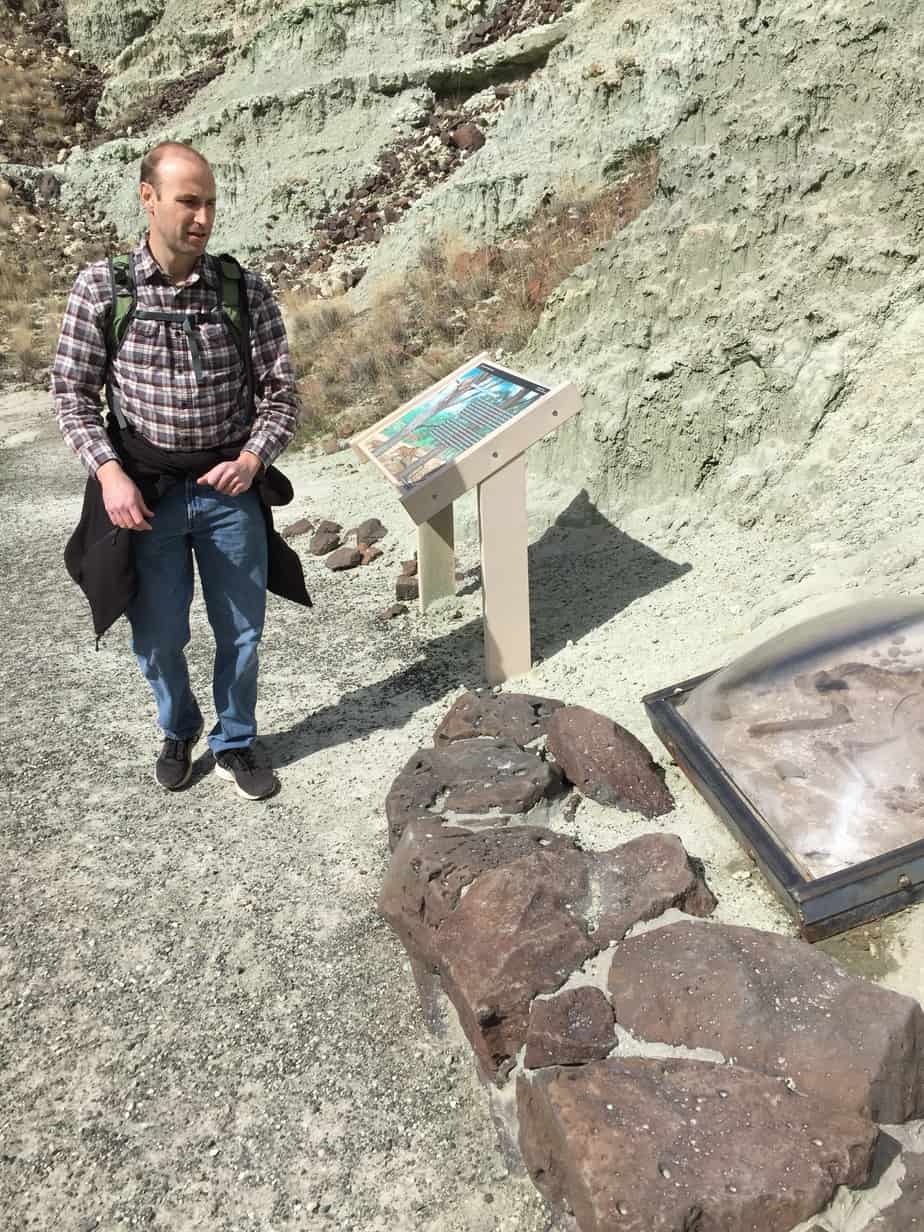
The best part of the experience is the wonder of walking among the green badlands. We couldn’t get over the color show and took picture after picture of the ridges, the green creek, and the trail under our feet.
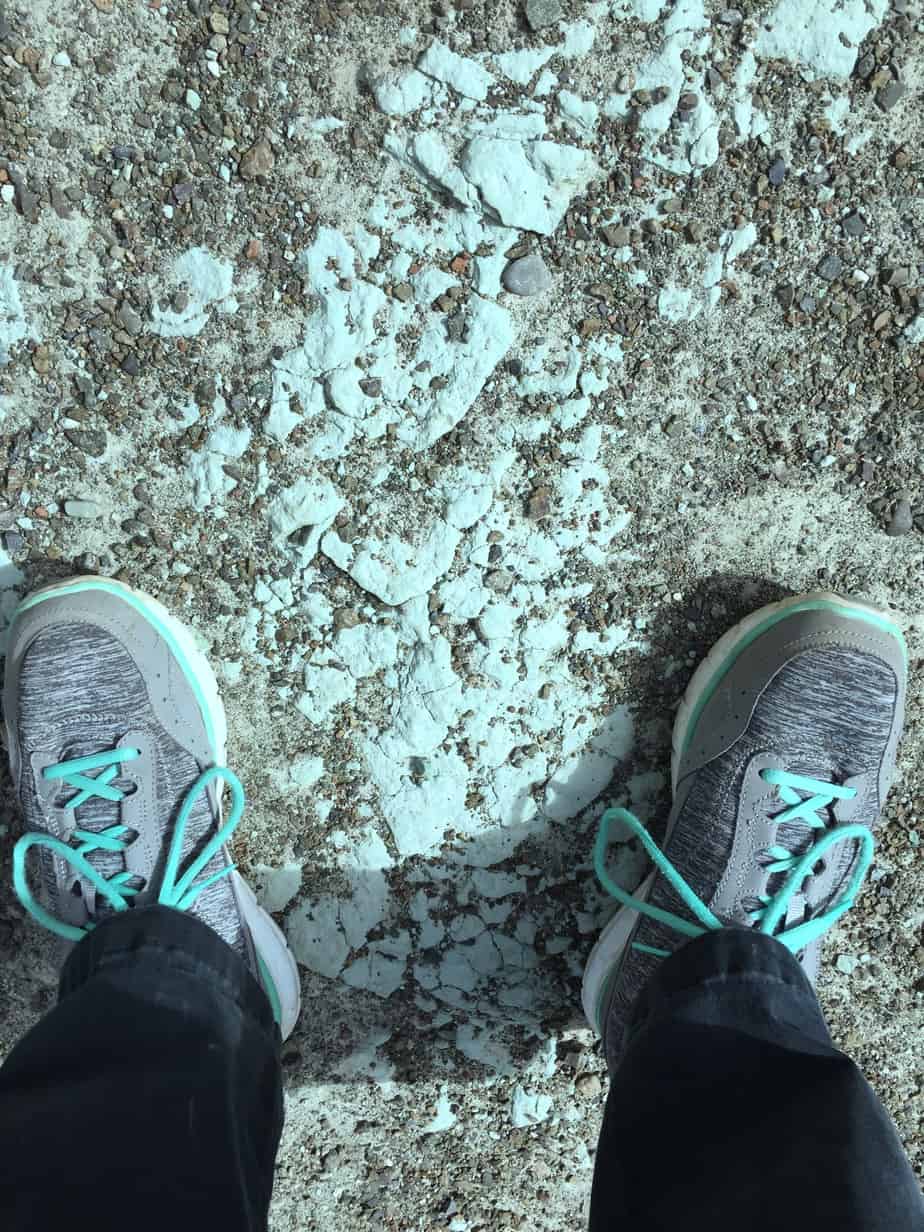
The Island in Time trail also offers some great perspective on geologic phenomena. You can’t help but notice a tall, pyramid-shaped stack of layers that stands on the other side of the valley. That enormous mountain is actually a tall stack of several basalt layers formed by numerous lava flows.
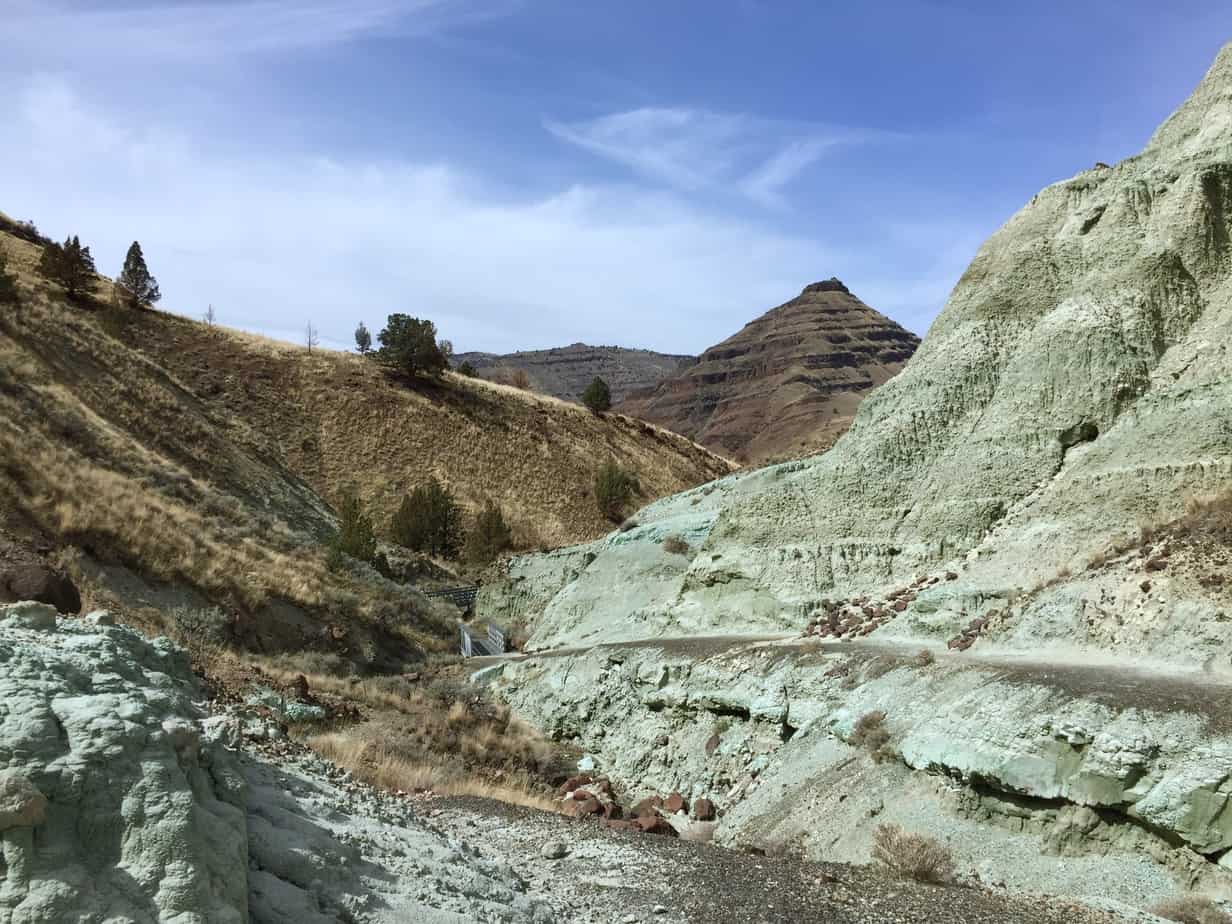
The wonder is that the John Day fossil formations developed before these lava flows. That means that the river actually cut through all of those lava layers before it exposed any of the fossil formations such as those seen at Blue Basin. That’s a mind-boggling amount of erosion!
Blue Basin Overlook Trail (Unrated)
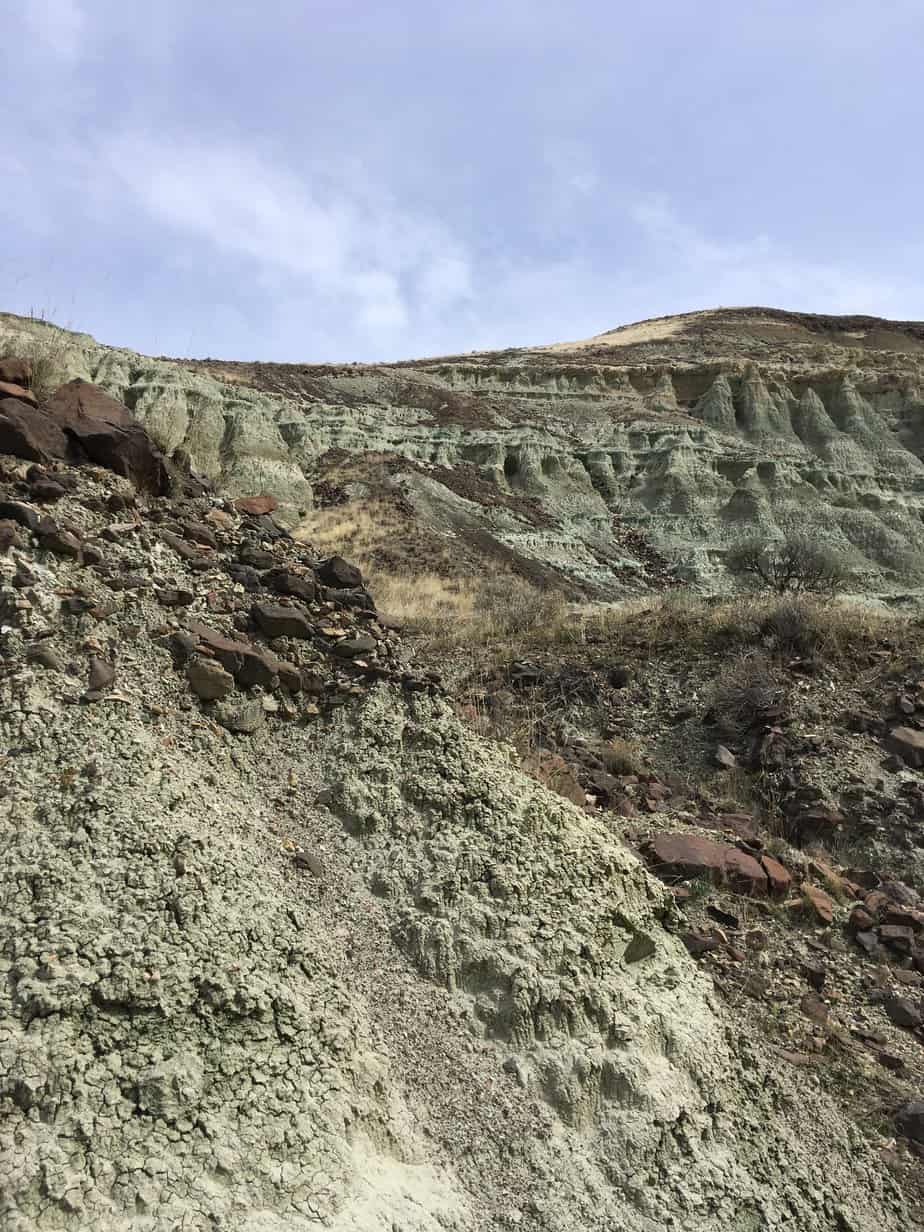
We didn’t have the opportunity to hike Blue Basin Overlook, however, I’ve heard people rave about this trail. The Trail brings you up over the Blue Basin Formation and provides a great view of the John Day River Valley.
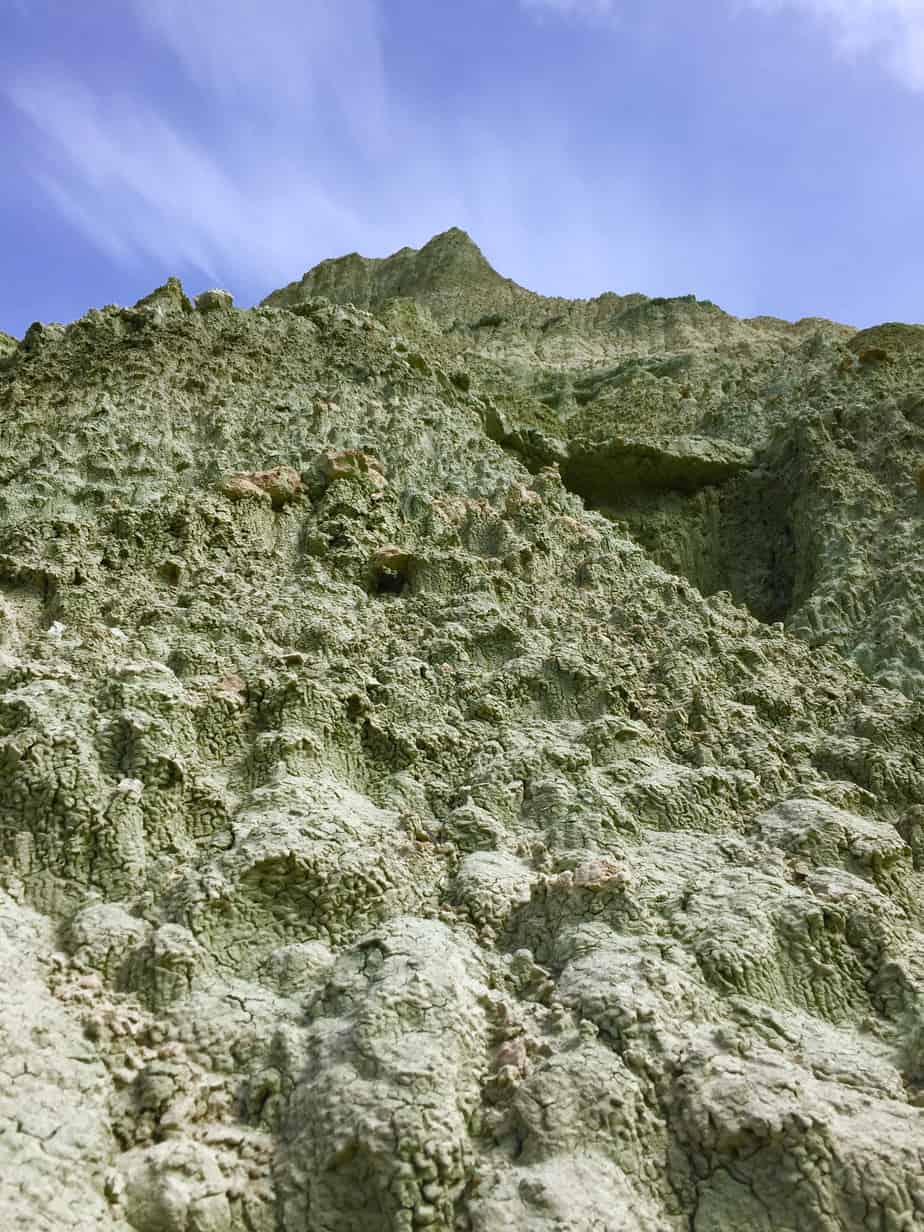
The Blue Basin Overlook trail is a moderate to strenuous trail with an elevation gain of over 600 feet. The rugged trail is 3.25 miles long round trip, and probably isn’t the best choice for a young family.
Know Before You Go:
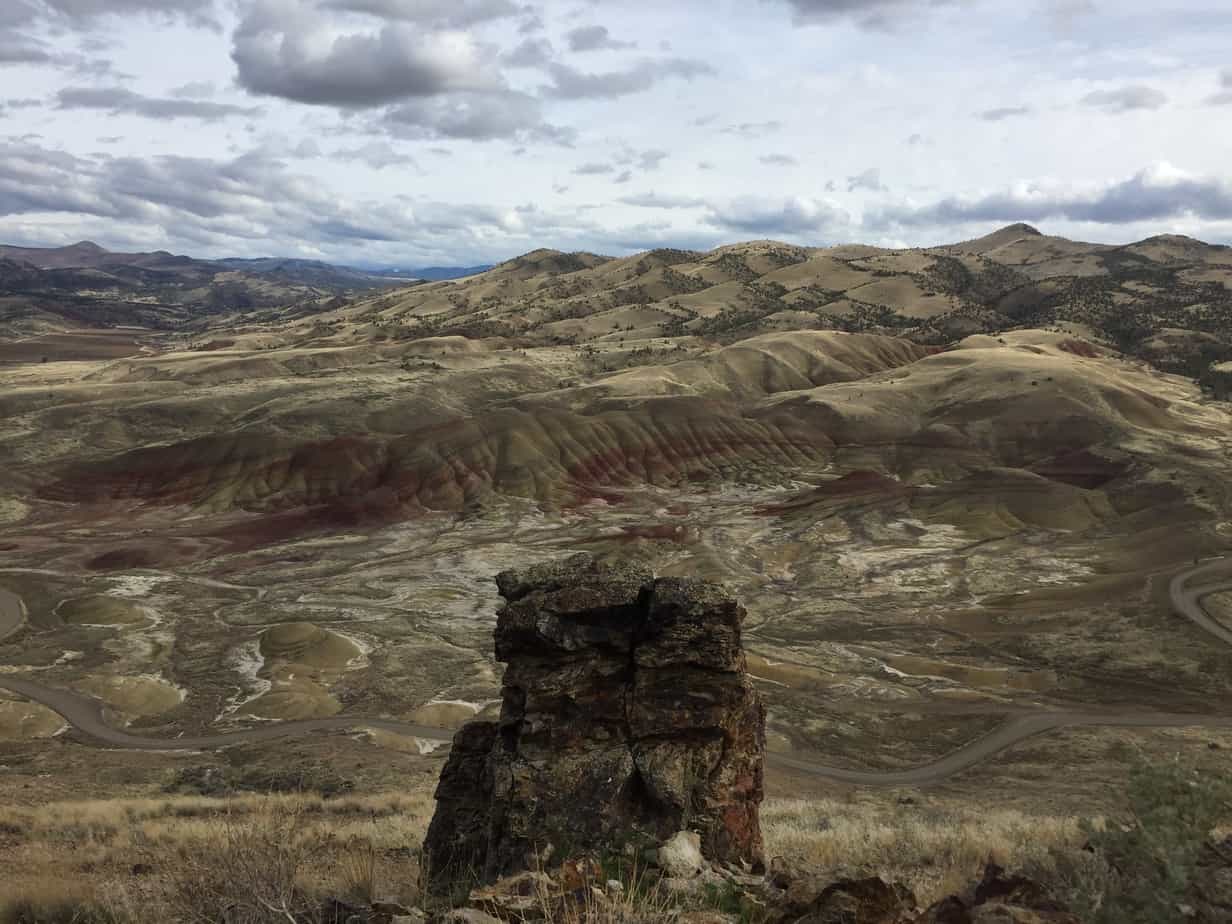
- Fuel up & Fill up: Towns and services are few and far between in this part of Oregon. Rural gas stations and restaurants offer limited hours and sometimes close early. Be sure that you have a full tank of gas, plenty of water, and lots of snacks before venturing off Interstate 84.
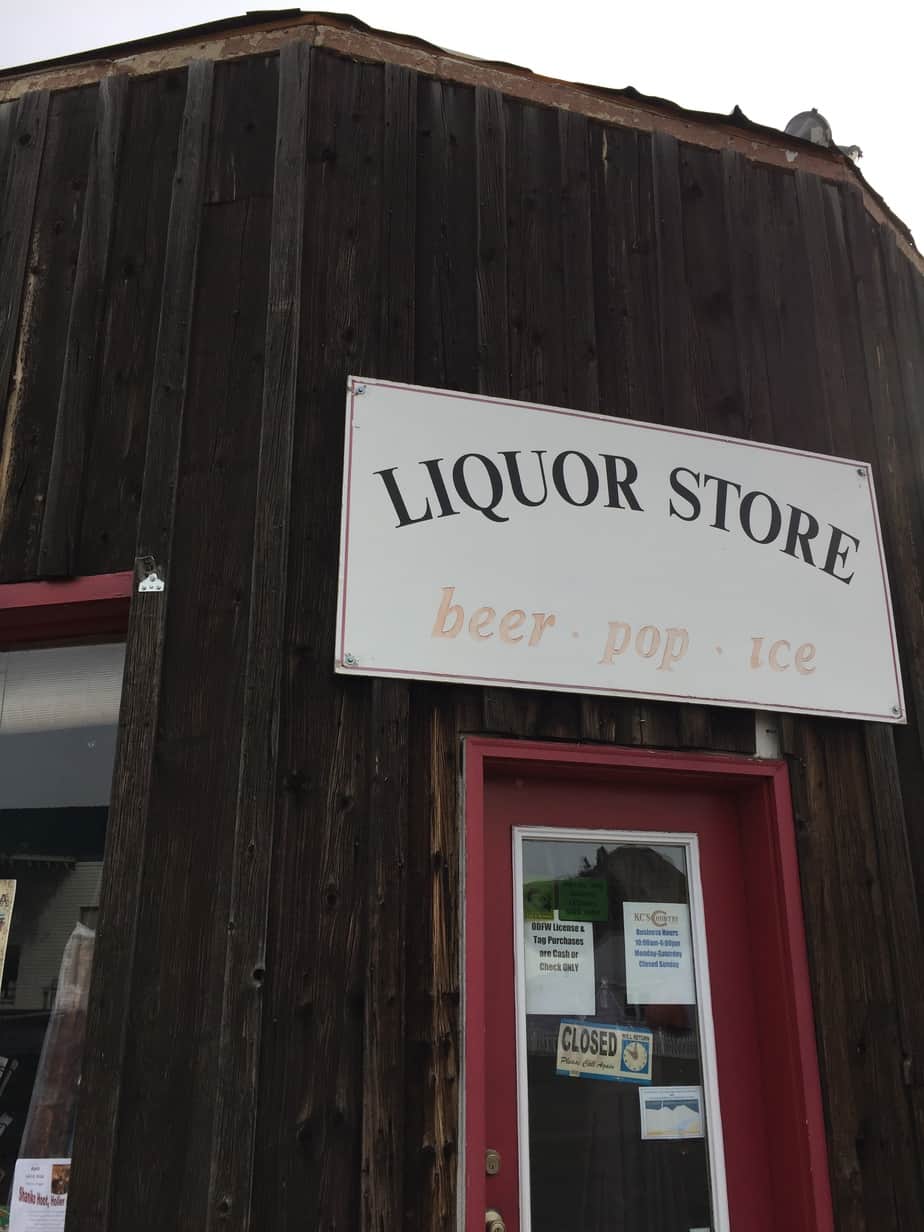
- Watch Your Step: It’s tempting to veer off the trail and explore the amazing fossil beds. However, the fossil beds are actually quite fragile. Use the opportunity to teach your kids about the value of preservation and scholarship.
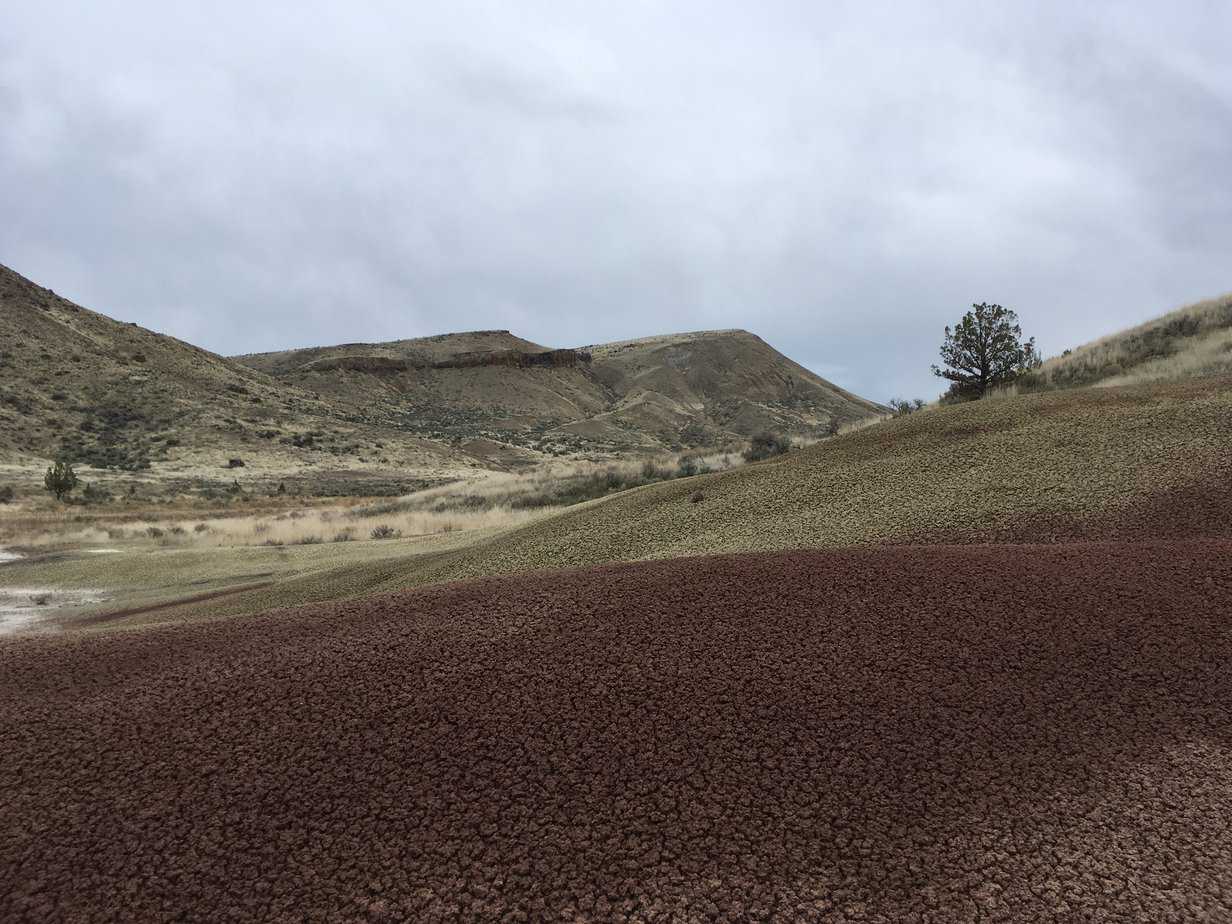
- Get Your Kids Ready: Your trip is a valuable opportunity to get your kids interested in science and technology. However, the Fossil Beds provide an enormous amount of information to take in (and teach)! Get your kids involved and excited early on so that they’ll be ready to explore what they’ve been learning about. A Lost World: The John Day Fossil Beds is a book written especially for young children (3-7 years). This digital book is an easy way to get your kids curious and excited about the Painted Hills and the John Day Fossil Beds.
A Roadtrip to Remember
Whether you call it Painted Hills National Park or John Day Fossil Beds National Monument, your trip will be time well spent. It’s hard to go wrong in this amazing, adventurous area. Enjoy your trip and then share with us some of your highlights. Happy travels!
© Copyright Brian A. Warren 2022.
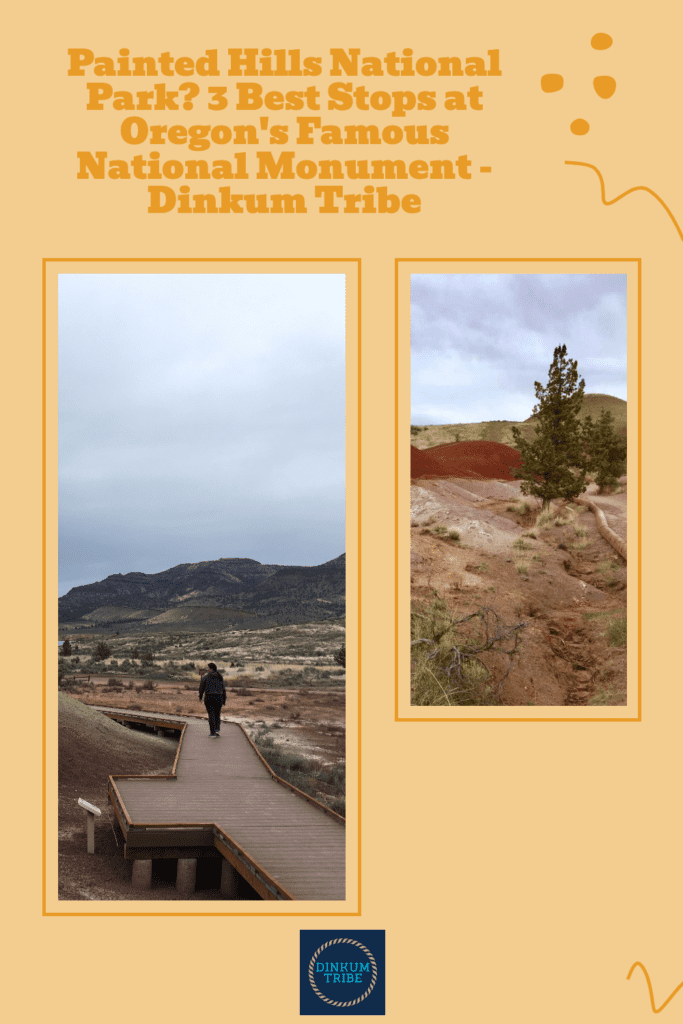
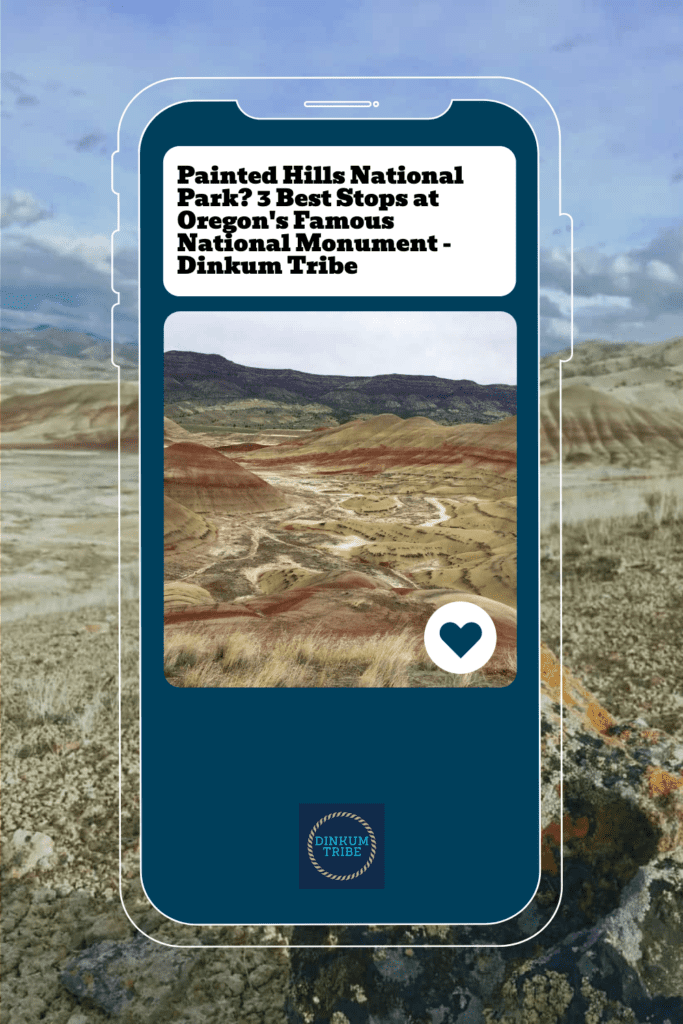
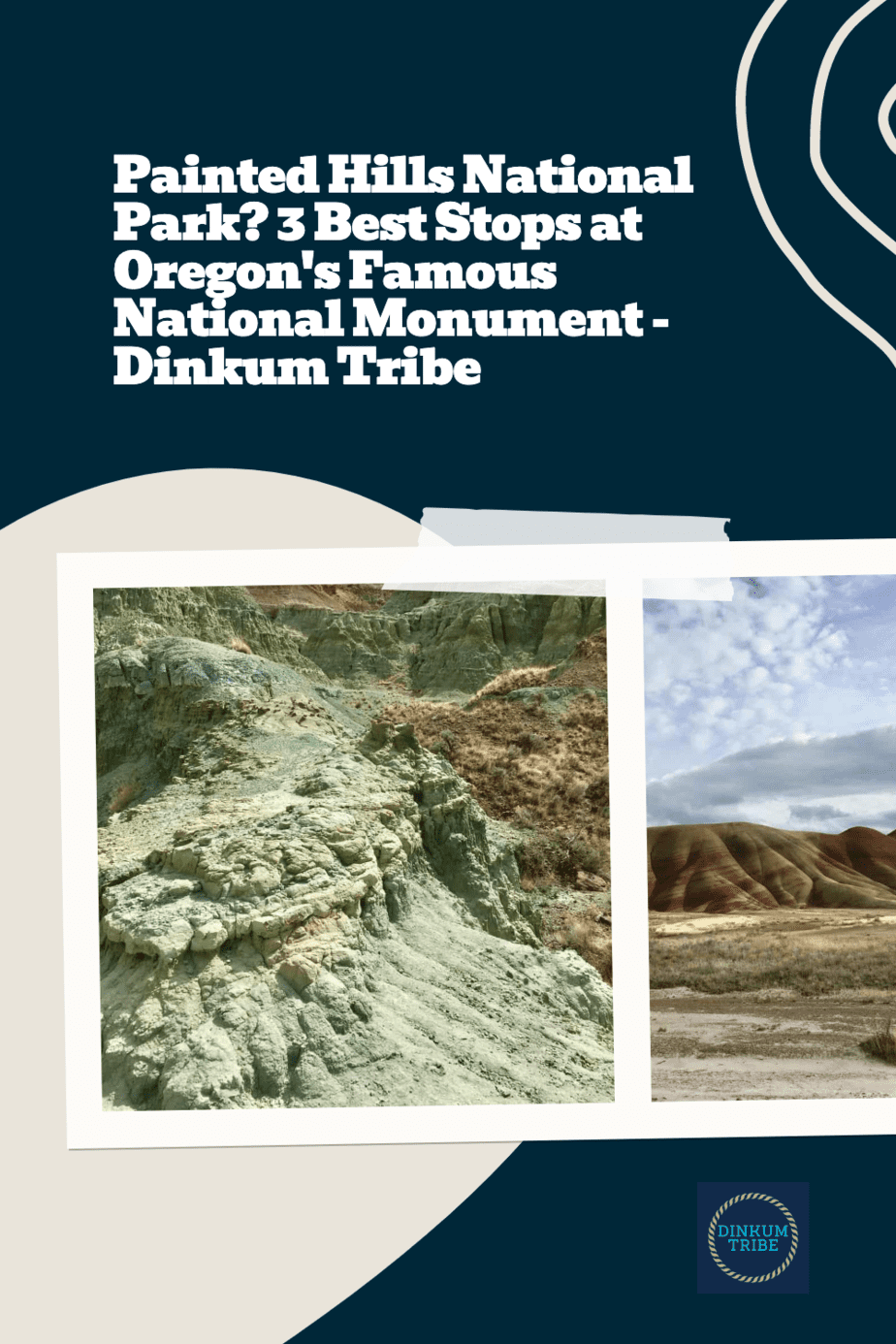
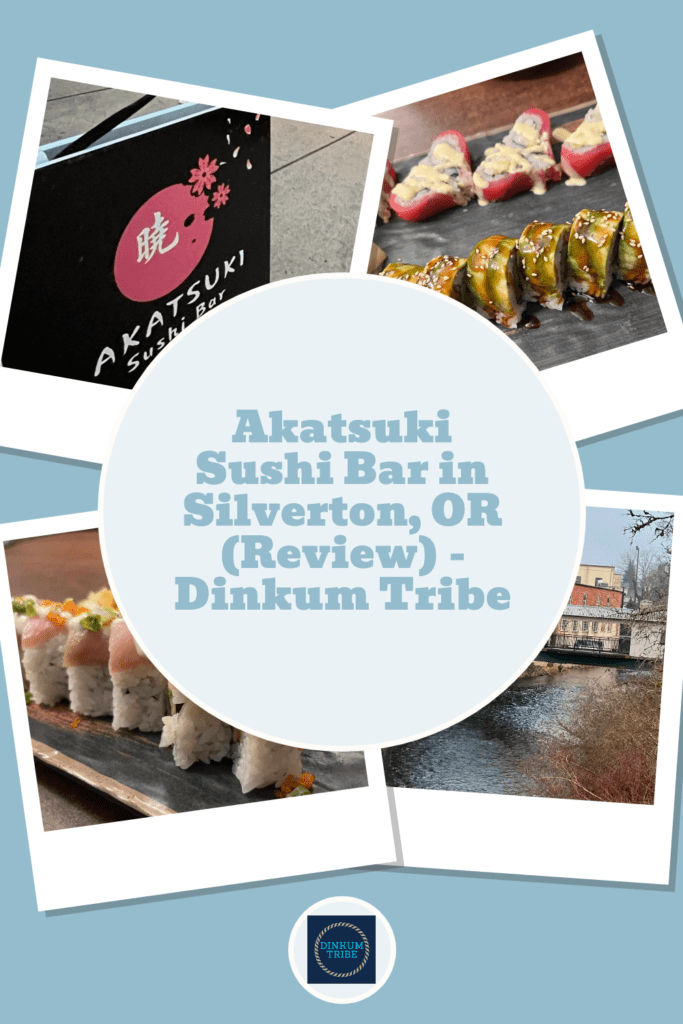
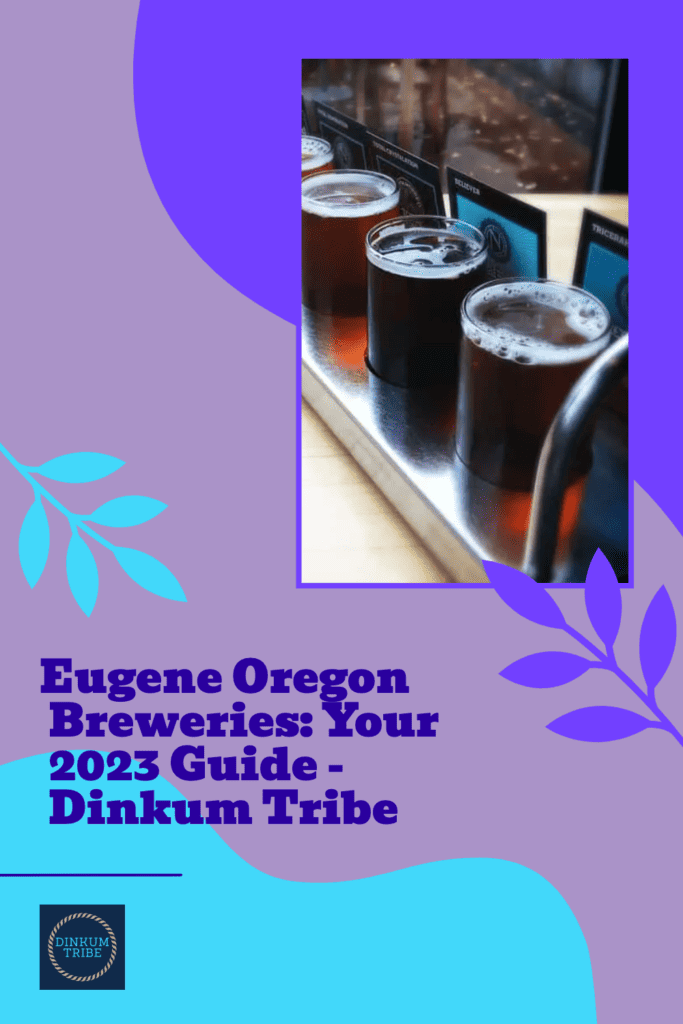
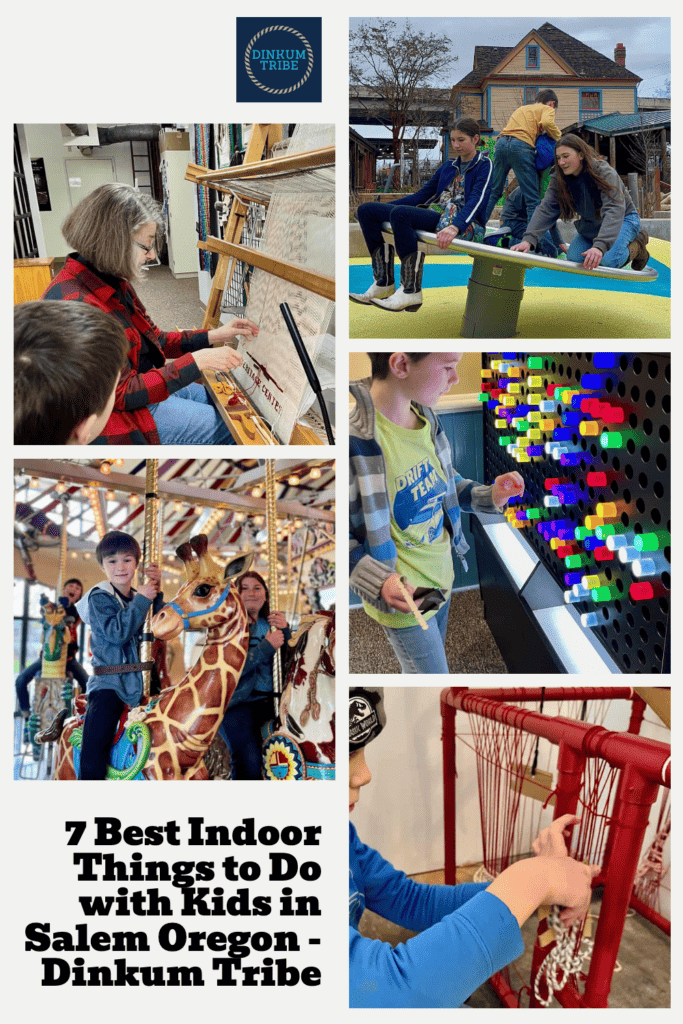
This is a great guide! You got to see so much more than we did. We unfortunately only had about an hour but that’s all we could take since we visited in the middle of summer and the weather was unbearably hot!
Oh yeah, summer would be UNCOMFORTABLE for sure!
Wow, the Painted Hills look unreal! I appreciate you saying that you should give yourself a few hours to explore because one hour wouldn’t do it justice. Adding this to my bucketlist!
We spent a week and still didn’t see everything!
Really informative guide and absolutely love the pictures!! If we ever get the chance to visit the Painted Hills National Park we will definitely use your guide, thank you.
Great! I hope you get to visit John Day Fossil Beds NM someday.
I am glad I read about Painted Hills in Oregon. This would be a great one for us to visit the next time we head down the west coast. I love the wide variety in the colours in the rocks. The view from the Overlook Trail looks stunning. And the fossils would be fun to see.
Yes, we really enjoyed all of our visit to the Painted Hills!
I have not yet visited this park, so this was super helpful information! I would love to do some of the hikes around the painted hills.
The hikes were definitely worth doing.
Wow this place is stunning and the colours must be amazing to see in person!! Would be definitely I place I would love to see if visiting the US!! Adding to my list!
The Painted Hills are truly awesome!
I love how informative this guide was! It was very inspiring to discover the place! The painted Hills look like a splendid place to take some epic photos
Exactly! All of our photos were shot just using a basic iPhone, but I can’t wait to go with my DSLR next time!
Wow, I have been to Oregon but never saw Painted Hills National Park. This looks like a great place to take kids, and would be ideal for an educational spring break trip. You gave a very detailed account, and truly the ultimate guide!
Yes we hope to take our kids there on a school break in the fall or spring.
This is definitely on my Oregon bucket list, such a beautiful state with so much to see!
Oregon really is quite impressive.
Wow this is amazing! I didn’t realise this existed in Oregon! Definitely on my list to visit 😁😁
I didn’t realize it was in Oregon until after I moved here, either!
Such a unique landscape. Would love to visit the paleontology centre!
It was really interesting to watch the paleontologists work!
Wow, I had no idea that a place like the Painted Hills existed – would you look at those incredible hues! Your pictures have me swooning! This is exactly my kind of a vacation – outdoorsy and surrounded by natural bounty. Thanks for writing about this, definitely saving it in hopes of visiting soon 🙂
It’s a really beautiful area and remote – the perfect getaway.